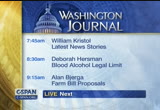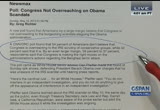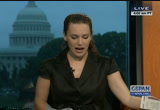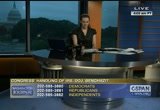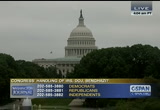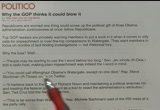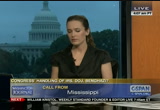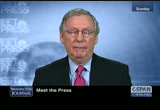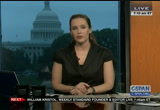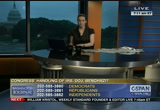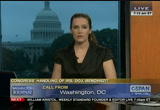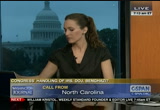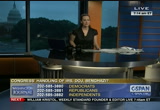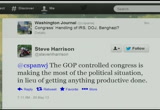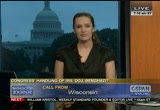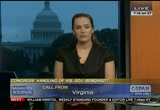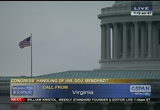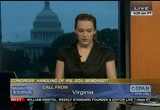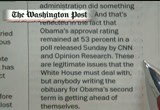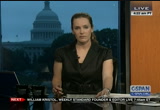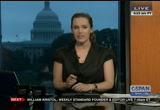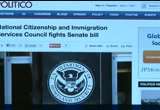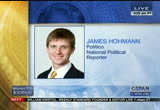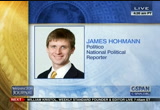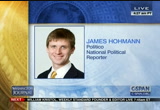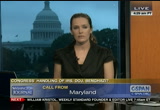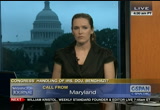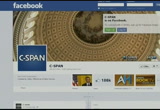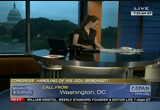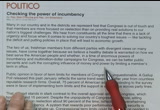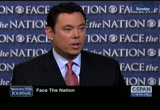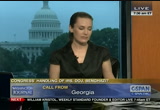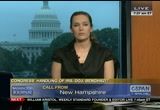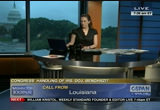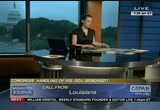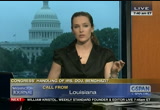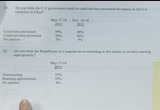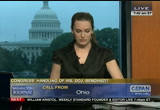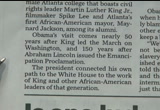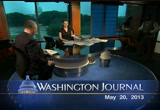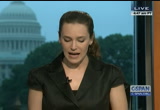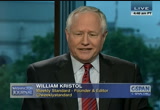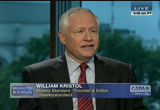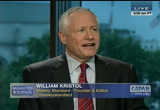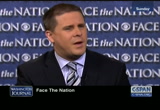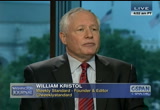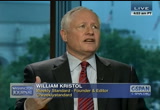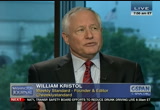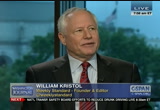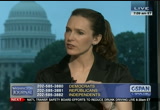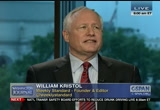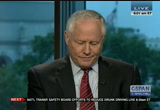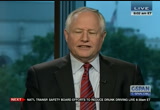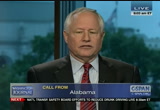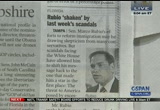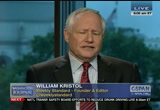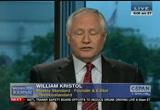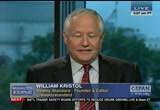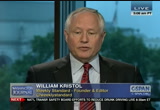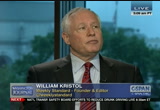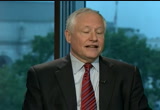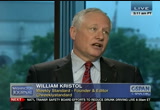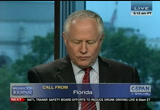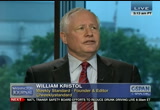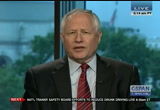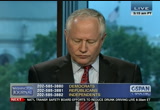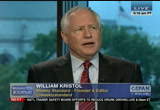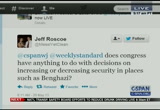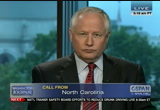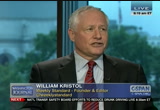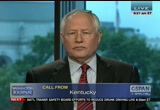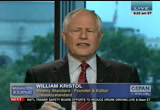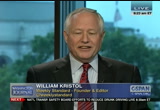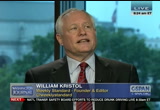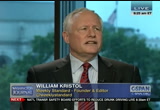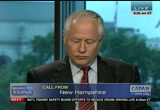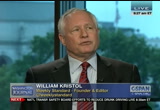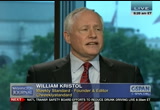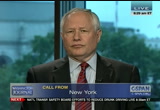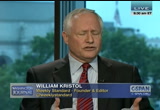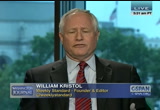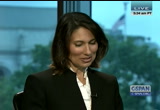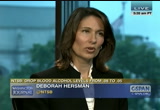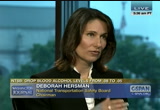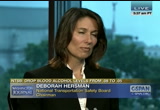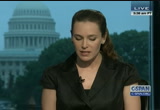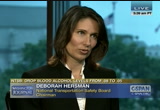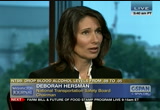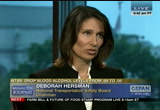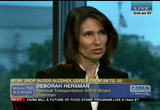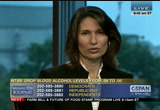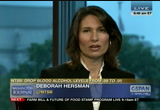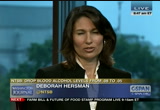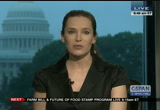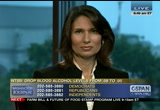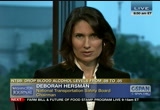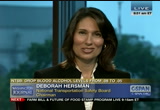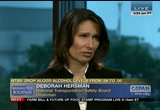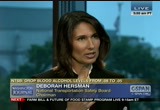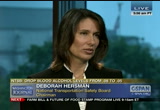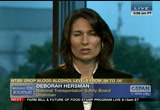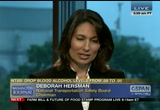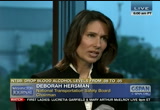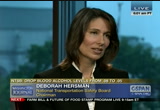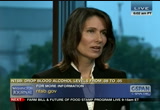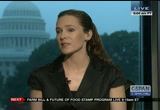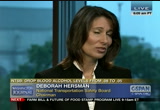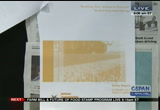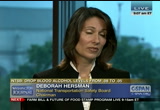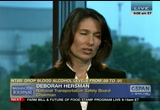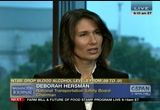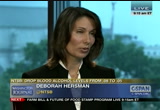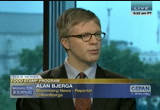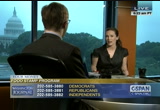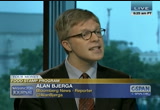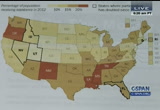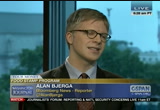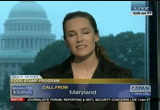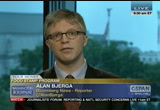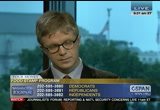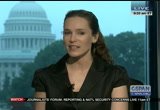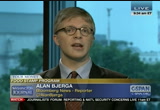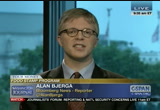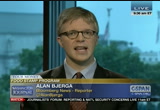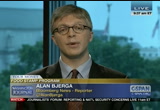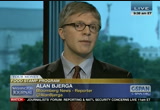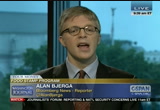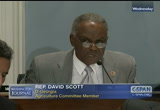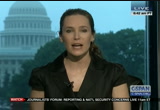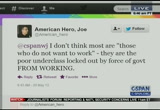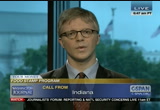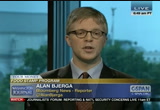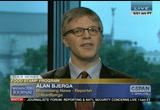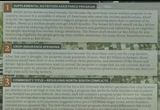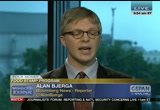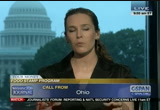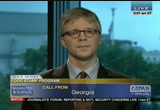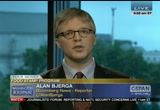tv Washington Journal CSPAN May 20, 2013 7:00am-10:01am EDT
7:00 am
legal blood-alcohol level. later, a bloomberg reporter looks at the future of the supplemental nutrition assistance program, commonly referred to as the food stamp program. "washington journal" is next. host: good morning and welcome to "washington journal" on this monday, may 20, 2013. the house and senate are in today. yesterday, members of congress took to the airwaves through the sunday talk shows, swinging in on controversial issues, including the i.r.s. targeting conservative groups, the subpoena of journalists' phone records, and last september's attack of americans in benghazi, libya. we'd like to hear what you think of how congress is handling these issues. here are the numbers to call. democrats, 202-585-3880. republicans, 202-585-3881.
7:01 am
independent callers, 202-585-3882. you can also find us online. end us a tweet by writing, @cspanwj. or join the conversation on facebook by looking for span spafpble you can also email us, journal@c-span.org. there's a new cnn poll looking at how americans rate congress' handling of the controversial issues that have been coming up in the past two weeks. here's from news max, a new poll found that americans by a large margin believe that congress is not overreacting to the burgeoning scandals plaguing the obama administration. a cnn/o.r.c. poll found that 54% of americans do not believe that congress is overreacting to the i.r.s. scrutiny of conservative groups, while 42% said that it is. by an even larger margin, 59% to 37%, respondents said that
7:02 am
congress is making the right moves on the administration's actions regarding the benghazi terror attack. while the poll came as white house senior advisor dan pfeiffer made the round of sunday talk shows defending president obama, we'll hear some of the sunday talk show excerpts coming up on the "washington journal" today. let's look at some other coverage. this is from "the washington post" outlook section this weekend. it says the i.r.s. situation is actually partially congress' fault. this piece says, it's congress that forces the i.r.s. to get political. host: that's "the washington post." here's "the washington times." in the house, republicans are going after the i.r.s., also the house law. and fellow house republicans took another vote friday to repeal president obama's
7:03 am
healthcare law. representative diane black, tennessee republican, filed a bill that prohibits the internal revenue service from targeting political groups with any data obtained by tearing out the overhaul. host: clara in minneapolis, minnesota. hi, clara. caller: good morning. how are you today? host: good morning. how are you? caller: very good. i haven't called in a long, long time, but i'm calling because our family discussed all of this information and everything coming out of washington this weekend. and they were unanimous that they were extremely angry at
7:04 am
congress once again setting it up and stating publicly they plan on doing nothing to allow the president of the united states to facilitate any of his agenda. and since thee chosen to act this way from the beginning of this first time inauguration, on inauguration day when they met together after the inauguration, that was their mantra as senator mitch mcconnell said, we wish to let them know that when we hear them throw on the sunday talk shows about impeachment, this time around we will not stand for it. that maybe means we need to separate. maybe we need a civil war, because they simply do not want to work with anybody that is a democrat. most assuredly this president from the beginning, and that is extremely disturbing to us. nothing is getting done, and all they're doing is salivating over all this. they failed to over 5,000
7:05 am
soldiers from getting into killed to get us into two wars. that they could manage to stop or work to stop. but this, this is what they're all excited about. and i think this time they better be very careful how far they want to push this. we're just so angry they can get nothing done, but this is what they can spend their time and money on, and they can get on a plane on friday morning and get out of dodge. they never even work seven days a week, five days a week. t's just -- it's a disgrace. host: here are some facebook comments. congress can't seem to handle anything anymore. the people want jobs. we want to build things. we want to prosper and move forward. will when they ever get that? and there's another one, conservative triage of political football as usual. and danny writes in and says the economy needs to be rebuilt.
7:06 am
so folks talking on our facebook page about issues, including jobs and the economy, as we ask you this morning, what's your opinion of how congress is handling these recent controversial topics of the i.r.s., the justice department looking at reporters' telephone records and also the handling of the attack in benghazi last september? politico has this piece, why the g.o.p. thinks it could blow it. republicans are worried one thing could screw up the political gift of three obama administration controversies at once -- fellow republicans. top g.o.p. leaders are privately warning members to put a sock in it when it comes to silly calls for impeachment or over the top comparisons to watergate. and they quote some of the comments made by members of congress, other republican leaders. here's what senator jim inhofe, republican of oklahoma, said, people may be starting to use the i word before too long. representative steve stockman, republican of texas, wrote, you can benghazi obama's watergate,
7:07 am
except no one died. and then senator ted cruz told the national review, it hearkens back to the days of richard nixon and maintaining a political enemies list and treating the federal government as a tool to exact the dministration's retribution. beverly, mississippi, republicans line. welcome, beverly. caller: i would just like to say that i never remember since richard nixon using the i.r.s. to take after the political enemies of either party, but this time it is so deep, not was going the i.r.s. after tea party groups, they were also sending tax returns of obama's enemy list out to journalists to parade before the public, which is strictly against the law. this has to be a special prosecutor, because with the congress trying to investigate it, it will never go anywhere,
7:08 am
because you've got all the democratic senators that are going to get up there and deny, deny, deny, even though they sent letters to the i.r.s. telling them to make special care against the tea party and the patriots and all of those. host: what do you think about how congress is dealing with all of this? caller: they're doing the best they can under the circumstances, and the fact that obama thinks he doesn't have anything to do with it and came out with that false anger that he showed, that just told me he does have -- he's the head of it. they don't do things like this without orders from above. host: well, here's a piece from the "baltimore sun." a white house aide says president obama didn't know the i.r.s. policy. a senior aide insisted sunday that president obama learned only from news reports that an i.r.s. office had singled out dozens of tea party organizations and other conserve tough groups for extra
7:09 am
scrutiny, while republicans vowed to investigate any white house involvement in the growing scandal. let's take a listen to senate minority leader mitch mcconnell on nbc's "meet the press" yesterday talking about what he sees coming out of the obama administration. >> actually, there is a culture of intimidation throughout the administration. the irsirs just the most recent example. let me recount a few for your audience. over at h.h.s., back in the obamacare sabet, secretary sebelius sent out a direct i have to health insurance companies telling them they couldn't inform their policy holders behalf they thought the impact of obamacare would be on them am now she's trying to shake them down for contributions in effect to a group to go out and try to convince the public that they should love obamacare. over at the f.c.c., there have been efforts by obama appointees to shut down or make difficult people who are seeking to buy advertising to criticize the administration. over at the s.e.c., the obama
7:10 am
appointees have been engaged in an effort to make it difficult for corporations to exercise heir first amendment political rights. coming back to the i.r.s., the head of the union at the i.r.s. gives 99% of her campaign money to democrats. she openly criticizes the republican house for trying to reduce government spending and has specifically targeted tea party groups in her public comments. it's no wonder that the agents and the i.r.s. sort of get the message. host: that's mitch mcconnell on the sunday talk shows on "meet the press" yesterday. we're asking enthuse morning what you think of how congress is handling the i.r.s. investigation or scrutiny into conservative groups, the d.o.j., department of justice's look at telephone records, also benghazi, libya. here's what charles writes -- my family discussed the scandals this weekend, and none of them felt the g.o.p. is
7:11 am
playing it straight. katherine, washington, d.c., independent, go ahead. caller: yes, hi. i just want to say that i start out as a republican. i became an independent. i still voted for some republicans. to say at this time, the republicans are disingenuous is to give them too much credit. they have pandered to the far right of our country for too long. so much from politics is the idea that absolute power corrupts absolutely. the right way is not absolute power, but they are so close to it. they control the airwaves. they have now a group of senators who someday, when somebody reads what people like mitch mcconnell and john boehner and ted cruz have said, they're going to look like the
7:12 am
people that oppose getting rid of slavery. these are the people the press should be pointing out, and the right is so strong, i'm sorry to keep continuing like this, but i really feel strongly, the right is so strong that the press has picked up their very anguage. every time i hear the word obamacare, it is called the affordable care act, and by god, you press call everybody else by its proper name. every time the press says politics and congress, that's the right wing. it's not politics. it's not congress. it's a small group of right-wing people. and right now the scales are so unbalanced there's no room for the middle anymore. host: let's hear from terry. canton, north carolina, republican. hi, terri. caller: good morning. how are you? host: good.
7:13 am
caller: after the last caller, it's hard to follow occupy that. i'd like to remind her that the democrats have had power in washington since 2006. you know, it was only clinton that put us in power. we will fix this. where are we at today? we're still paying almost $4 a gallon for gas. when bush left office, gas was $1. 5 a gallon. and obama come in and raised the prices right back up. host: tell us more about congress. you talked about control of congress in terms of politics, but elaborate on what you think about their performance right now. >> i think republicans are doing the right thing. mean, like some of the other callers, i haven't seen this kind of corruption since richard nixon. richard nixon was not impeached. he resigned to hold the presidency up to the standards,
7:14 am
that should be impeached. host: here's what joseph writes on twitter. try reading the inspector general report, referring to the inspector general report looking at the i.r.s. randy, michigan, democrat. caller: good morning, and thank you very much for c-span. my comments, i'll start out with, when we listened to mr. senator mitch mcconnell, we still have to remember, he actually got on the senate floor and stated he was going to do nothing but make a president a one-term president. well, he didn't do that very well either. and they haven't been doing worth a darn ever since. they're targeting the i.r.s., that was 1/3 of the applications ruffle, i think it is, if people actually look into it. and the 501-c's that are supposed to be social welfare groups, not political groups. so, yes, we do need an investigation on that, and if they were not being social welfare groups, we should go after their tax stat us and get back the money they should have
7:15 am
paid. benghazi, are the republicans mad because only four americans were killed and not thousands like under bush's illegal war? that's why impeachment, when that comes out of their mouth, it's a laugh, because they have absolutely no idea when to impeach somebody that's doing something seriously bad. and the a.p. story, i think that shows why we have to protect all the constitutional amendments equally. i'm a second amendment advocate, even though i'm a democrat, and i want to protect the first amendment just as much as i want to protect the second so. thank you very much for letting me speak, sanduff a great day. host: steve on twitter writes in and says the g.o.p.-controlled congress is making the most of the political situation in lieu of getting anything productive done. let's listen to white house senior advicer dan pfeiffer on face the nagse yesterday. >> there are very serious issues, particularly the i.r.s., and the point that our
7:16 am
chief of staff is making is that this a republican playbook here. they don't have a positive agenda to try to drag washington into a swamp of partisan fishing he dicks and trumped up-allegations. we're not going to let that distract us from the president doing the people's work. host: we're asking you what you think of congress' job of handling the trio of issues that have caused controversy over the past week or two. our next caller is kelly in wisconsin on the independent line. hi, kelly. caller: good morning. i guess i'd say they're making a lot of political theater out of it, but it's giving material for jon stewart and "saturday night live," and thank god for those folks. i read a book called "idiot america: how stupidity became a virtue in the land. free." i've got to tell you, i listen to people call in on this program all the time, and they're all full of opinions, but real short on facts. we don't know what happened with any of these scandals or
7:17 am
so-called scandals yet because they haven't been looked into. i don't know what barack obama knew or didn't know, and i know none of your callers did either. maybe we ought to just not follow the lead of our politicians and stand on soap boxes and badger like braying donkeys and actually do a little reading and a little investigating, a little homework before we start opening our mouths. but that's just not the way of america, i guess. i think congress is a joke. you know, they've got all kinds of half-truths and stuff to say, but let's face it, the investigations haven't happened yet. richard nixon, a long investigation went on into him and we had the same thing going back then with people jumping to conclusions. i wish we'd maybe take a deep breath and realize we're all in this together. we're all americans. we're all going to sink or swim the idea that the president raised gas prices, it's ridiculous. the president doesn't control gas prices any more than the
7:18 am
governor of wisconsin does. people, just take a deep breath, stop listening to the fools on the news media and the politicians when they're on c-span making speeches rather than doing work, and i thank you very much for c-span, because it is a great program. this is one of the most things i've ever seen, and you have a great morning. host: on twitter, how could anyone say republicans are corrupt when the facts are coming out about democratic orruption? greg, independent, go ahead. caller: yes, i'm an independent because i'm a republican or a dixiecrat. it's been noticed that it's ironic the notwithstanding this n these people who are attacking president obama. i'm not going say i'm a staunch supporter of the president, but he is our president, and he did not cause the death and a fake caused. president
7:19 am
he did not commit a crime like president nixon. i think the elephant in the room is racism. mitch mcconnell said he didn't want this man to get a second term. they have been dead set against working with our president, and they don't want to admit it because it's politically incorrect. but there are people that are staunchly against him because he's an african-american. host: focus on what you think about congress, senator mitch mcconnell. caller: ok, i think congress, many of them being in the majority, they have this feeling, and america has not progressed to the degree where they're willing to look beyond racism, so congress is using every opportunity. i'm starting to feel compassionate. as i said, i'm an independent, and i'm starting to feel compassion for president obama. they don't refer to him as the
7:20 am
president. they call him obama, which is very disrespectful. they call it obamacare as though they stated earlier, and it's the affordable health act. they disrespect this man and constantly try to find any policies, tack his and that is congress, and it's a shame, because we had a divided congress when we had the civil war in this country, and we have got to get beyond this and deal with the issues as they are. whether he's a good president or bad president, the man cannot do anything if congress is determined to stop him at everything he tries to do all because they don't want an african-american to be successful at this position. host: "the washington post", the best thing that happened to republicans and the best thing that happened to democrats. and this past week, the best thing was just about everything. president obama endured one of the most difficult weeks of his entire presidency, if not the most difficult, and is looking
7:21 am
less and less like a president with control of both his administration and the political direction of the country. host: president obama appears unscathed. despite attempts to tie the scandals and controversies to the white house, there's still no smoking gun that shows the administration did something beyond the pale. and that's reflected in the fact that obama's approval rating remained at 5 % in a poll released yesterday by cnn and opinion research. these are legitimate issues the white house must deal with, but anybody writing the owe lit wary is getting ahead of themselves. we're talking about how congress is handling these issues. here to tell us more about the agenda is the national
7:22 am
political reporter at politico. hi, james. guest: thank you. host: thanks for joining us. what do we expect to see this week in terms of hot-button issues, including the i.r.s.'s scrutiny of conservative groups? are we expecting to see more hearings, more panels convened? guest: yes, there will be more hearings, and republicans will continue to try to draw new information on the i.r.s.. they obviously are trying to get balanced how much they want to pursue these issues. but for now, it's aggressively. it's not going to be like last week when everyone was under the colleague lights and everyone was watching hours and hours of hearings. host: tell us more about what we're watching on the farm bill. guest: the house agriculture committee and the house passed the farm bill. the senate passed a version last year, and as part of the fiscal cliff deal, they
7:23 am
extended the old one until september. and so now a bill has passed both chambers that sets the stage for really a conference call to meaningfully negotiate what the farm bill is going to look like. it's basically a massive, huge bill, and the big holdup right now is how much do you cut food stamps. republicans want to make pretty significant cuts into the food stamp program, and democrats agreeing to smaller cuts, but also trying to reduce the amount that some farmers get for various crops. scommoip we'll be talking -- host: and we'll be talking more about the food program later on his morning at 9:15. james homan, i am gation. much was the focus on a senate judiciary committee. where does the immigration debate stand in the senate, and
7:24 am
what are you watching? guest: there's going to be a union of border guard agents that comes out today, according reports, against the senate compromising. i think at this point the -- we're pretty much looking and whauching what's going on in the house to see before, you know, we move -- before we get more traction in the senate. everyone wants to see how much the house can get done and how far the house can go. it feels, even though there's kind of daily movement like there's a broader holding pattern. host: one of your colleagues reports in politico, national citizenship and i am gation services council fights the senate bill. you can find that on politte tow.com. congress leaves town next week for the memorial day recess. anything that has to get done before they leave town? >> no, and the memorial day recess is going to be key. everyone sort of wants to know how people are going to respond
7:25 am
to immigration, which has been really overshade ode. there's not going to be any last-minute legislating this week, which is why i think it will be a relative quieter week than last week. and i think members want to get back and make sure that they're kind of running interference on the potential pullback on immigration. host: on the front page of politico's website, it says democrats hope scandals are in the rearview mirror by 2014. we've heard some of the republicans from the sunday talk shows already this morning here on the "washington journal." how are democrats in the house and senate talking about the issues that have been in focus? guest: they are saying -- i think president obama, acouple of days of not knowing what to do, last week adopted a very traditional strategy for how you respond to these kinds of scandals, which is to express great umbrage, to say that he is as offended as anyone to get rid of some people at an agency, and i think that
7:26 am
democrats have gotten on board with that playbook, which is democrats are expressing outrage about what happened to the i.r.s., distancing themselves from the president who, as you just note a minute ago, has not been directly implicated, which is a key thing. and then i think that they're trying to get rid of the culture of scandal. the republicans keep trying to connect the dots between the somewhat disparate events, and republicans last week were able to group three different things together as the three scandals. and democrats are trying to disgroup them, tackle each of them individually, and basically hope that republicans overreach, that they start attacking the president personally, that they keep pounding harder and hard when her there's not -- when they're not connecting it to the white house. although we continue to see drip by drip, new revelations come out about who in the white house knew what, when, and new information starts to emerge
7:27 am
that the democratic strategy will look potentially problematic. host: and finally, james hohmann of politico, we sthee piece, obamacare repeal now about the i.r.s. how is the the affordable healthcare act, how are they being linked by members of the house right now? guest: the i.r.s. scanleds has given the republicans the ability to say we can't implement the affordable care act and give the i.r.s. the ability to manage your healthcare fines if you don't have healthcare coverage, because now they're going to have access to all this information and potentially beat everything. taking a step back, in the big picture, republicans believe that government is basically the i.r.s. and the d.m.v., and that is, in a nut shell, what the problem with the big powerful centralized government is. and so dissatisfaction with the i.r.s., fear of the i.r.s.,
7:28 am
bombsters the republican argument that there shouldn't be some big central, strong, powerful government program. and to that extent, the must be is on their side on the i.r.s. they're trying to use that to help their case on limiting obamacare implementation. host: james hohmann, politico national political reporter, giving us perspective on the weekend. thanks so much for joining us. guest: thank you. host: we're asking what you you think of how congress is handling some of the big issues right now. lydia is our next caller, upper marlboro, maryland, on our democrats line. hi, lydia. caller: good morning. i'll make three quick points, and i'm going start with the internal revenue service. the internal revenue service is doing a bad job. these nonprofits have run amok. now, american crossroads with karl rove is one of those
7:29 am
nonprofits. nonprofits are supposed to be a social welfare organization. people donated money to karl rove. he spent $100 million trying to buy the president for mitt romney. now, you think how much taxes the government could have collected on that money if it wasn't for the nonprofit. i'm a senior citizen, 76. i'm trying to survive on $23,000 a year. in 2011, our internal revenue service, $448, which i had to pay. george bush had the internal revenue service look at the urban leerk the naacp, and large black churches. where was outrage at that time? the democrats didn't make a big fuss. they let it go. the republicans are overplaying their hand. but in 2014, black people, we want a turnout just like we did in 2012, we going to clean
7:30 am
house, and nancy pell's he's will be speaker again so we can get some things done. they are punishing the american people for re-electing the president. as for benghazi, this is a nonissue. 3,000 americans were killed. after the 9/11 report, democrats let it go. we didn't want to tear the country apart with an endless investigation, unlike epublicans. as far as the a.p., that was the most inside al qaeda and they were filtering reports to british intelligence that they were beginning to plant a bomb on a british air ways flight on the way to the united states. 300 or 400 people could have lost their lives. if they find him, they will kill him and his entire family. the government have a right to know who's leaking this information. host: first on twitter -- joe
7:31 am
writes in who is telling us this is no big deal? this is referring to the i.r.s. -- here's some comments on our acebook page -- host: austin says a lot of people assume this is an issue with the left or right. this isn't so. the issue is authoritarianism. and matthew says i'm tired of the blame game. it's not fun and not fair. you can join our conversation at facebookc-span. lisa, las vegas, nevada, republican. go ahead. caller: really? host: hi, lisa. ca
7:32 am
at. the i.r.s. is way out of line the d.o.j., they reinstated the patriot act. if the shoe were on the other foot, we would be hung out to dry. love the show, thanks. caller: until host: welcome. caller: thank you. i'm a vietnam vet and as far as benghazi goes, i was in a situation where if they didn't do the extra effort to get there and get us out, i wouldn't be here today. our government did nothing. and that goes to him going to bed the president. he needed to be up in the situation room taking care of business. his job is to make sure that all this other stuff that's going on there should be transparent purchase host: what about congress's job? weigh in for us on what is what congress should do. caller: a lot of democrats even judge off the boat if you
7:33 am
notice. it's not just the republicans. it's also democrats. host: ok. mike, republican caller. hi, mike. caller: good morning. i guess you're really trying to get on the view of the congress but i would say is like the previous caller, most of the facts are not known. so let's not rush to judgment. let's not just make this about partisan politics and let's hold people accountable. the thing that's lacking in our country and that's really concerning to me as a parent is the notion of accountability. hold them accountable. and so let's get these hearings done and let's see. i'm an advocate of term limits in the private sector. how does congress continue to serve and why do we continue to elect these people? host: last piece in politico written by some members of congress.
7:34 am
they are democrats from texas, republicans of oklahoma. their editorial piece says checking the power of incumbency and it says many in our country and in our districts feel that congress is out of touch -- host: so looking at this question of term limits, which our caller, mike, a republican in washington, d.c. brought up.
7:35 am
let's take a listen to another clip are the sunday talk show. this is utah congressman representative, he was on cbs, "face the nation." guest: this administration said they want to be open and transparent but they haven't. we have four dead americans. we have a military that couldn't get there in less than 24 hours. we have a death trap that was in benghazi and in tripoli that didn't meet the minimum of standards and four and a half months after the attack, the secretary of state still says the people on the ground made those decisions the people on the ground never made those decisions. and you have susan rice and the president and the secretary of state and the secretary of defense for weeks telling the american people well, it was this video gone awry. there was this mob -- that was never true. people deserve the truth and the families deserve the truth. i can't imagine that this administration would say the same things about what happened
7:36 am
in boston where we had four people killed by terrorists. host: congressman talking about benghazi. david is our next caller, independent. hi. caller: thank you for taking my call. i don't think that the republicans are actually digging deep enough. i mean, you can go back. any businessman right now can go and try to verify either one of obama's social security numbers and he's not even eligible to work in this country. i mean, it's not being dug deep enough. i tuned in this morning. i've been off not watching all for a week because the officials are not -- bill crystal is going to be on. it's just not enough. and we re-elected these individuals to do their jobs. they're doing what they're not supposed to do. they're being too soft here. if facts were known, it simply is not enough. the giggs being done because
7:37 am
they're scared of this administration. host: we will have william kristol in our show in just a little while. that will be coming up soon. let's hear from eric sheen, a democratic caller. hi. caller: hi. how are you doing? host: good. caller: ok. i got a short statement to make. i think the democrats and republicans are messing up our country because it seems like they're playing a politics game and i've never seen a president be so disrespectful since -- i really don't know. being 60 years old and i see they got a black president, it's like everything is coming up not roses, but it always seems something is happening and our country is falling apart. and the people are the one who's suffering, not the go. they've got jobs. we ain't got no jobs. we're losing a lot of things. host: okay. here's what we heard from congressman charles rangel,
7:38 am
democrat of new york yesterday on abc's "this week," weighing in on the republican agenda. guest: there's no republic agenda except to stop the president of the united states. it just seems to me that there's no evidence that whatever went wrong, it was known outside of cincinnati. they should have been better trained to deal with a very sensitive piece of legislation that was abused by the left and the right. host: congressman rangel of new york. let's hear what mike has to say, new orleans of louisiana on our independent line. hi, mike. caller: good morning. host: morning. caller: i would like put a lid on the me-me coming from the eft here about oh, republicans -- one, where does craig hicks fit in on this republican witch hunt? he's a lifelong democrat,
7:39 am
supported hillary clinton for president and voted for obama twice. so to say that benghazi is a right wing democratic republican, which is ridiculous, the i.r.s. -- i mean, this was going on for a long time and it's a huge thing. i mean, this is one of the most feared agencies in our government. and what are we to suspect that they talked about when they talked to the white house? golf? i mean, they admitted they did something wrong. talk about neither investigation -- how about we just start dieting people and throwing people in jail here? this isn't a republican or democratic thing. the i.r.s. has been abusing people since the -- they were nvented.
7:40 am
we don't need these people looking at our medical records. i mean, let's save some accountability here and if you want to talk about left wing bias in the media, i want to bring up free advisors. one from abc, one from the cbs and one from cnn that all have a brother, a sister, and a wife, all are -- or husband, that are in the advisors to -- obama administration. the presidents of those agencies. host: frank, what about congress? you talked about your opinion of a range of issues but what did congress do? are tray doing enough? caller: of course kroenke never does enough. -- congress never does enough. that's a silly question. 14% approval rating. do they do enough? no. they're not doing enough.
7:41 am
they need to get -- i mean, i want to see some accountability here. this is not enough. if they don't hold this administration accountable for the obvious crimes that they're committing, i guarantee you the voters will hold them accountable. host: here's a cnn poll that just came in this weekend. do you think the republicans and congress are overreacting to this matter and this is looking at the i.r.s. question or are they reacting appropriately? -- host: when asked, do you think they are overreacting or are they reacting appropriately, 37% said overregulating, 59% said eacting appropriately. caller: good morning, libby. good morning, america. oh, my god, i don't know where
7:42 am
to begin. it's almost as if facts don't matter anymore. so disappointed with the republicans. they ran on jobs, jobs, jobs in their 2010 term. and people believed them. and they voted the republicans back in. but what have they done since they got in? they've attacked the president over and over and over and i don't know. it's almost as if they are attacking the president don't create jobs. repealing the affordable health care did not create jobs. holding all these hearings have not created one job. and now we're going to the i.r.s. it's not going to create one job. host: here are some other stories in the news. president obama delivered a
7:43 am
commencement address yesterday. he spoke at moorhous college in atlanta. he told the graduating class that there is no longer any room for excuses for this generation of african-american men and it's time for their generation to step up professionally and in their personal lives. and moorhous college is the country's preeminent black college and it goes onto talk about how the president shared his own personal story and shared some of his own experiences and then also looked at the history he connected his own path to the white house to the work of dr. martin luther king and other african-american leaders of that generation. the president's visit comes nearly 50 years after king led the march on washington and 150 years after abraham lincoln issued the emancipation proclamation. the president plans to speak on >> to. he's going to offer an overview of his administration's counter-terrorism policy in a
7:44 am
speech thursday addressing such issues as the legality of the covert drone program and his pledge to close the guantanamo detention center. this is from the "wall street journal." some other stories from the news, banks have paid less than half of the $5.7 billion in cash owed to troubled home makers brokered by the government in 2008. delaying -- and chinese hackers resume attacks on u.s. targets. the military units is seen as using new methods to retrieve data. it looked at kansas and how the crops and lands are faring out there. it is dry and the fertile planes
7:45 am
are steadily turning to dust. let's take one last call on the question of how congress is handling a trio of issues, the i.r.s., the department of justice and benghazi. rose, harrisburg, pennsylvania, republican. hi, rose. caller: hi. i just want to say i'm going to keep it short and hopefully sweet. i think the president doesn't know anything about anything. you ask him and he knows nothing about nothing. how is he going to push agenda through? you've got to be on top of things to implement things. thank you. host: coming up next, bill kristol, "weekly standard" editor will talk about the republican handling of the i.r.s. targeting of conservative groups. also, benghazi, and he will take your calls. later, deborah hirschman will talk about federal plans to crack down on drunk driving. we'll be right back.
7:46 am
7:47 am
she reluctant will you played the role of hostess for her husband but when he was assassinated, she returned to ohio and ensured his legacy by making their home into a early version to the presidential library. we'll look at the life of lieu career yeah garfield before the role of first lady when her brother chester arthur became president. live tonight at 9:00 eastern on c-span, c-span3, c-span radio nd c-span.org. host: our guest is william kristol, founder of the "weekly standard." thank you for being here this morning. we're seeing a new poll coming out asking whether or not americans thinks congress is overreaching on the obama scandal. 54% don't believe congress is overreekting but 42% say there is.
7:48 am
there is a danger in republicans pushing us too far? guest: for now, they're undecided. there's of course a danger. they can say stupid things but so far, the hearings have be brought to light a lot of important new facts. two days into the discovery of fact about something, is congress overreacting? let's step back and say would we know what we know about if congress haven't had these hearings? no. the president of the united states has said that it's important to discover what happened to the i.r.s. it was unacceptable and so forth. so so far, congress has done a public service by blinging these things to life. -- bringing these things to life. host: we heard senator say we might hear the impeachment
7:49 am
phrase, the i-word, and then we saw reporting at "politico" writing republicans are worried one thing can screw up the political gifts of three controversies at once. guest: yeah, but this is typical to "politico." everyone's thinking ahead and how will this ricochet and all this? i think it will be safe. people can say whatever they want. it's not going to change the american people's minds that benghazi was a pretty terrible mistake by the administration about they were not truthful later. those are just facts. and facts matter, actually, and everyone in washington loves to spin and counterspin and how is this going to play out? the facts are bad for the administration. host: bill kristol, how do you tease out the facts and separate from it politics? guest: well, you can never
7:50 am
really fully separate from it politics but in this case, we know much more today than we did a month ago or in the case of benghazi, and that's partly because e-mails were made available and they were given so congress because congress and the senate held up the confirmation of john brennan in return for getting access to these e-mails which the white house had public a week or so ago and the i.r.s. case, there was a report but that was done following congressional complaints which mocked and said that's conservative paranoia that turned out not to be at all. i think the facts are coming out and the facts matter most. reality matters most and we have a situation. and a situation in domestic policy which is a real problem for the administration and the question for congress is to continue investigating and the
7:51 am
case on the i.r.s., what can congress do? congress appropriates funds. benghazi happened. and we can investigate it. it's not clear that me that congress can do much. they can't bring people back to life or change the situation of libya overnight. but in the case of internal revenue service, congress can do hings legislatively. >> what would be a real scandal in washington would be if the president had been involved. this is handling the right way. what happens when the problems come to light? do you take decisive actions to fix what the president is doing? guest: i love that. that's a fantastic inside baseball point of view. just because he is president of
7:52 am
the united states, and people in the executive branch are doing things they shouldn't do, no, he's not responsible for that. as long as the white house is not careful not to get involved so they are not accused to any kind of cover-up, then they're fine. that's not the case. he is responsible. i.r.s. is part of the treasury department which is part of his administration. it's obviously different if he ordered people to go over income tax returns or a bunch of agents made a decision based on his own rhetoric and the rhetoric of the democrats to go after tea party groups and over conservative party groups and used scrutiny for them as opposed to liberal left wing environmentalist groups but what he's doing about it incidentally? i think congress should move legislatively to do certain things about the i.r.s. and put the president on the spot. has anyone been disciplined? are there new rules in place?
7:53 am
any notice anything that the president has done. maybe he will do some things. this is a case where congress can say at least for now, we want this agency to have more power and this is where i think the health care act comes into play. they really -- in my view, the house of representatives and the senator didn't get -- should pass legislation saying that stop the i.r.s. or stripping the i.r.s. of any authority to enforce the new affordable care act and just say we just can't trust this agency. let the president explain why we have to move ahead at 100 miles an hour to initiate this legislation which has all kinds of other problems. but the key part of which has to be administrated by the agency which turns out to be somewhat out of control. host: here's a cover of the "weekly standard" and we can see inside this written by our
7:54 am
guest, bill kristol. the "weekly standard" will do its part with pleasure -- host: if you'd like to talk with ill kratzert, -- bill kristol, call the numbers on your screen. "the washington post" outlook section this weekend asks a historian says you're not a true second term president until people yell watergate. is it fair to make comparisons to watergate? >> it's not particularly helpful, i don't think. suddenly, the liberal media is outraged of people using that
7:55 am
and it's overstated. let's just look at these scandals on their own. it's simply to say and i slightly agree with some of the liberals who were saying republicans will go too far. you can't depend on scandals to win the presidency. you can't depend on scandals of the other party in power, especially if you're having your own positive agenda. reagan had pretty big scandals iran contra and i was in that dministration. one re-- so republicans need is appropriate. congress has to go ahead and investigate this and they have to look at remedies in the case of the i.r.s. and some of these other scandals. but they also have to be a positive republican agenda on health care and on tax reform and on a whole bunch of other
7:56 am
issues. and at a better foreign policy. they can't just say scandal, scandal, scandal. but that doesn't mean that it's not utterly legitimate. what is congress going to do? that is a key role of congress. and one thing we have learned about this administration is they're not exactly forthcoming about their own mistakes. they were not out there when they first heard reports of the i.r.s. it's not like the president picking up the phone saying hey, hat's going on up there? this is why congress has big role. host: bill kristol writes in the real scandal. obama's liberal policies are morege his managerial scandals. let's hear from laura, democrats
7:57 am
line. hi, laura. caller: hey. journalists find themselves a target, are you afraid that more of them might retaliate by speaking out in the residue found in the world trade center? host: world trade center. guest: no, i think the world trade center was attacked by jihaddists. host: you're a journalist. your magazine certainly has a message and a tone, but as someone who is a founder and editor of a magazine, what do you think about the justice department's accessing reporters phone records of the "associated press"? guest: let me tie that into the story.
7:58 am
we've had no problem. i mean, they don't actually attack those who might be able to fight back. and that's particularly creepy aspect of the i.r.s. scandal. it has nothing to do with the president but this is why conservatives do not like big go. that's why we are worried about expansions. and i think that broader theme is one that the conservatives and republicans should use the i.r.s. scandal to advance. in terms of the justice department, investigation of the associated press is, that is one that is harder to judge from the outside. you don't know what they knew that led them to think they had such widespread wiretapping, i guess it was and taking a look -- not wiretapping. the looked at people's phone records. it's hard to judge that from the outside and look for all the talk about republicans overreaching. a leader saying he wasn't willing to criticize the administration on that. so that would be an easy thing
7:59 am
to criticize the administration on and the media liked it. i do think mcconnell has been responsible and yeah, i just don't feel like -- that one is hard to judge from the outside. host: let's go to north charleston, south carolina on the independent line. vincent joins us. caller: hi. i like to say i agree with mr. kristol that i don't believe the i.r.s. should give, you know, more standard of powers with the obama care and then i also like to ask him a question. does he fear that the tax will be a pretty good replacement for the i.r.s. with the system that we have now? thank you. and i will hang up. host: did you catch all that? guest: i did. host: yeah, thank you.
8:00 am
8:01 am
basic fairness of the tax system i assume we would need that. the general intrusiveness of obamacare, the way the intrusions on individual liberty are striking. that's a legitimate point for critics of obamacare and may be former supporters of obamacare to allow them to rethink their support. >> we have william kristol his past experience includes leading the project for the republican future. he also served as chief of staff for vice president dan quayle. he's also been a professor at the university of pennsylvania in harvard's kennedy school of government. let's go to john in livingston,
8:02 am
new jersey who's a republican. high john. caller: since you're in the media bill. i wanted your insight on something. given that more and more people stopped trusting the government and corporate media now, what can the establishment do to keep this from googling building seven and realizing that buildings in new york were brought down in preplanned controlled demolition on 9/11. host: we already addressed that issue. let's go to gary on twitter . would you agree that the department of justice and benghazi, would you agree none of these will impact the 2016 election? guest: i think generally speaking presidential elections especially if it's reelection of a president, there will be an open seat in 2016 as there was in 2008 2008 and 2000.
8:03 am
it happens. generally speaking it will be forward looking election of. obviously general adjustment of the obama administration will be important but that will be mostly driven by whether people think foreign policy has worked or economic policy worked. i'm optimistic about the republicans in 2016. it's unlikely for the country. it's unlikely foreign policy will be judged success and his economic policy isn't working too well. obamacare is a disaster and it's a total train wreck. it's beginning to be implemented. people will be very open to a message to repeal and replace it with a real healthcare reform good for consumers, healthcare and the country. i kind of agree with the scandal, it's not the history, the scandals particularly effected next presidential
8:04 am
election if the president himself isn't on the ballot. in off year it's the general sense how the administration is doing and spills over into the administration in congress. the democrat and the senate have not done anything in the way of oversight over the obama administration. i think they will be voters out there have been few more republicans in the senate in the senate wouldn't hurt in terms of checking this administration. host: immigration gary brought that up. what's your perspective how that's shaping up in congress? senator marco rubio he's in the washington times today. he said the senator's effort to reform immigration maybe drawing skepticism from many conservatives. it allowed him to shift his message back to the one that made him a star in the first place. guest: i'm a big fan of marco
8:05 am
rubio. i saw him a couple weeks ago and he tried to persuade me that the immigration bill is good one. i've always been somewhat liberal on immigration and open to immigration reform. i think this piece of legislation has all kinds of problems. one of the problems instead of addressing particular problems in the immigration system, this is your classic washington 848 or whatever it is page bill. huge number of parts, extremely complex. turns out you have to have 125% poverty line to stay in the country. one big problem with the bill, whatever your views on immigration, i think it's unmanageable. if it it pass through, it will be reported out in the senate, judiciary committee this week.
8:06 am
i guess you'd have to bet now that it probably makes it through the senate but it will have much huge problems in the house. we've had pieces on both sides. if you step back and look at the two months or so debate, the bill began despite all the money on the side of legislation and the establishment media being in favor of the legislation, the critics are winning the debate. just a policy matter if you look at the actual arguments out there and go online and read and critics and defenders, the critics have a better of the argument. i would say right now i prefer to live with status quo for a couple years or pass particular pieces of legislation rather than pass the legislation. host: let's hear from sheila in alabama from the democratic line. caller: i'm calling from wittenberg, alabama. i would like to make a comment.
8:07 am
the american people spoke in two elections and i think it's not about benghazi and the other scandals. i just think that the republicans are scared of 2016 and they are trying to do everything in their power to bring president obama down. also hillary clinton, thank you. guest: republicans have been worried about 2016 because they've lost last couple elections and lost the popular vote and the republicans have to do some work on their own party and their own agenda. the truth is the republican party has been pretty restrained in my view. if you compare it historically to democrats in 2007 and 2008 and the bush administration, compared them to media on abu
8:08 am
ghraib. people will say those republicans are worried about this. benghazi, was that a success story of state department security or military rescue on that night or telling the truth afterwards. we not suppose to talk about it? i think it's ritual position -- ridiculous position to take. they'll have to make argument on public policy. it's perfectly legitimate to look at these two issues and they are larger. benghazi is emblematic of obama's foreign policy.
8:09 am
the president seems to have had no interest in even pushing on it. afterwards he wanted to blame some video that never turned into a movie here in the u.s. rather than blame those who were responsible. on the i.r.s. again, i said earlier, it's a certain feature of the kind of big government we set up i think it's a problem. it's perfectly legitimate for members of congress for republicans and some democrats showed some concern about these things too to raise these two issues as questions both about the management by the obama administration of the executive branch but also about obama policies. either we're going to have a much larger i.r.s. implementing obamacare or not. that's a policy question. either we will have a more aggressive foreign policy.
8:10 am
host: jill in alabama brought up hillary clinton. it looks at where some of her 2008 presidential advisors are now and what they are prospects are and whether or not they'll be aligning themselves with her in a policy 2016 run. what are your thoughts on this and how the secretary of state, the former secretary of state goes forward now? guest: there's a problem in hillary clinton. these advisors in 2008 weren't going to be with her in 2016. honestly it will be a gift to her in 2016 if she's the one told them she doesn't want them with her. i would say that's a sign she's learned something from the fiasco in the 2008 campaign. i was talking a democrat who said for him that would be one way he would judge rather she will be a strong candidate in
8:11 am
2016. may be by pushing these people out, she would have learned a lesson. people watching the old pros and experience, how can you push out the last people who won the last election. david axelrod and plouffe won for obama. the same is true to karl rove. he did pretty well. some of the old pros in 2008 and 2012, the republicans weren't so great. i'm a fan of bringing in new people. if hillary is intelligent enough to say who the best winning races at the state level, let me have them run my presidential campaign not people who have been around 20 or 30 years ago.
8:12 am
host: william kristol weekly editor. let's go to florida, a republican. caller: good morning. now that the congress has brought to light the issues surrounding the i.r.s. scandal, i think it's about time they step aside hold a special counsel and proceed to give instructions to special counsel to address this from a violation of civil rights. mainly title 18. these are very serious allegations and they should be brought to light based on a criminal investigation. identify the individuals and bring that to a special grand jury to determine whether or not they should be prosecuted. interestingly enough, when you start doing it that way, people start talking more when they look like they're going to be facing serious indictment. the penalties are serious with regard to jail time.
8:13 am
guest: i i that the justice department has to appoint special counsel. i don't know congress can appoint special counsel. congress can pressure the obama administration to appoint special counsel . i'm not a fan generally of special counsels, they often abuse their dependence. let's see i would say in this case, whether the justice department seem to be doing a serious job in investigating and may be criminal violation. we don't know. i come back to congress, congress can legislate. congress does appropriate. if congress wants to say to the i.r.s., we want every 501(c)(3) and c4 applications that groups trying to get the status, we
8:14 am
want all of them dealt with in 60 days. we want i.r.s. to send people the applications granted. or they can say -- this is all legislative, these are all matters of legislation and rules regulations made pursuant to legislation. as i said earlier, they can curtail the jurisdiction of the i.r.s. -- i think congress needs to be serious about its role here and the i.r.s. is not something independent of congress. host: let's go to oak hill, west virginia. caller: good morning, how it everybody. my question is on benghazi. why did the ambassador and the other three individuals go to benghazi when there was a doubt
8:15 am
on the security of benghazi? why did they go? i have not heard anything in any of the talking points or the hearings on this. it's very curious why go into a dangerous area without an escort? host: what would you learn from that and why is that significant to you? caller: if you go into unsecured area without enough support, you are at risk for life and limb or something to happen. if you just look at history, i should say, armed forces don't go into dubious areas where they cannot succeed. host: okay, william kristol. guest: ambassador stevens went there to have meetings.
8:16 am
he felt it was secure enough to do his job. lot of americans abroad do things that are risky. he did seem so request security different times. whether he could have gone with light security, that's hard to know, obviously. i guess that can be second guest. two of the americans were the team that came to help once the attack began in benghazi, they came from tripoli. there i think we were -- the question of what happened in those 8, 10 or 12 hours, who knows. once the attack began the whole u.s. government was alerted. they testified to that and had as far as -- conferences with
8:17 am
secretary clinton. she spoke to president obama around 10:00 p.m. that night. president obama never spoke with the defense secretary or any military after that previously scheduled meeting that afternoon. he was on the phone constantly saying is there anything we can do or can we send security there. people i spoke with in the military are really appalled no serious effort was made. host: question from jeff on twitter, does congress have anything to do with decisions on increasing or decreasing security on places like benghazi? guest: generally the state department security they can mandate particular level. that's mostly left up to the discretion of the state
8:18 am
department. host: let's go to marion of north carolina. caller: i wanted to talk about the real scandal. one, it seems the republicans can't understand they lost and they shouldn't be just obstructing the president in every turn instead of trying to move this country forward. secondly, they need to understand that the healthcare is the law and wasting $52 million trying to repeal it 37 times, how ridiculous. they should be trying to improve it. third and lastly, it seems that congress, the republican congress is not tried to do anything to move this country forward and only goal is to obstruct. that's hurting the country and hurting individuals. guest: obviously the president won the election and no one is contesting that. i voted for congress.
8:19 am
obviously he won the election but members of congress have their role too and i don't think it's been any lack of deference. the truth is republicans were reeling in the first few months. they over interpreted the president's victory. you discussed many times, republicans were in total panic and they lost five or six elections. it's not republicans fault that president obama couldn't get gun control legislation to a democratic senate. it's not republicans fault that the actual immigration bill being debated. lot of critics are winning the argument about that bill. it's not republican's fault that benghazi happened and it's not
8:20 am
happened on thepresident'ss. watch. the presidenpresent and he has a l of power. we're not supposto roll over and get t vote once every four years and be quiet. host: william kristol, here are some of his recent pieces. "losing the game" reflecting on president obama's recent press conference. how he's dealing with some of the tough issues of the day. looking at everything from middle east politics. the inaction and the deception where bill kristol writes about benghazi. you can see the cover here on the latest issue of the weekly standard. let's go to everett in louisville, kentucky a republican. caller: bill kristol i think you're doing a great job. i would like to say that the
8:21 am
president is -- why isn't anyone surprised it's not happening when the president is one of the least qualified people ever to be in office but my question is on the i.r.s. everyone is talking about the picking of the tea party list. isn't not just the picking of the tea party list, it's the questions that were posed to the tea party list and then the subsequent investigation of all of these organizations and these individuals and these republican contributors to romney that happened afterwards. those are three separate things aren't they? to me that's one of the most important questions is how this huge investigation went on. thank you very much for being here today. guest: thank you for your kind words. you're absolutely right about the i.r.s. scandal.
8:22 am
it is more than just targeting particular groups. it's the kind of questions that are asked and the list is unbelievable. no one in the i.r.s. -- if the i.r.s. is set up so that no one know about that above a certain level, above a bunch of agents, people have that kind of discretion that's the problem. that's why it's so ridiculous to say the president didn't know. it's the government out there that we have no control over. really? isn't that part of the treasury department. isn't the president proud of nominee of treasury secretary. shouldn't be be ordering -- it does show the testimony friday t shows the kind of arrogance the sort of people who get comfortable in a big bureaucracy that used to bullying people. the kind of arrogance that they
8:23 am
display. it's the kind of lot of conservatives and liberals warned about. it's not the kind of government we want and deserve. i agree as congress investigates this scandal, it is really a scandal, they need to looks at different aspects the questions that were asked, individuals were asked as well as the groups denied resolution of application of tax-exempt status. congress needs to say how can we fix this. i don't think you can trust the treasury secretary or the new i.r.s. official to fix this. the one that most appeals to me, this was introduced last week by congressman price and georgia and senator cornyn in the senate, until the i.r.s. is fixed, let's not expand their authority. host: we mentioned you had a recent editorial losing the game, that focused on the middle east. what should the u.s. role be in
8:24 am
the syrian civil war going forward? were there any good things or mistakes made in the past? guest: when the president said we were committed to getting rid of assad, we didn't do anything. now it's gotten a bad situation. i still think intervention on the side of the rebels will be a good idea. assad is an ally of iran. he's butchered tens of thousands of people. we have some ability to shape things there. i think we can end up with a better outcome there. we've had a little case study the last 10 years, it can be really messed up. we saved the situation with the surge and president obama didn't negotiate a deal that left the
8:25 am
troop there is. intervention is not a recipe necessarily for success either. i think the president has been passive in respect to syria. he said from the beginning we can't do anything that would be one thing. but to say assad must go and don't do nothing, really hurts the u.s. there were all kind of instability right in the region. the broader lesson i saw diplomas and different middle east in the country about a month ago, i said what do you think of our foreign policy, he said only one word answer. syria. the degree to which we look weak and not serious and the implications of that for other countries in the region friend and foe, that's pretty serious. caller: matt is from concord, new hampshire. hi matt.
8:26 am
caller: my only problem recently, i noticed this, i'm 55 years old. when i was a kid, there was truth to reporting. you sat there and said there was no military response. there was a team sent to italy from the united states and a team sent to tripoli in the united states. the second part of that was the annex was the cia operation. most cia operatives i know, i have a brother in the military, had military experience. so, it's not like there was nobody there to defend chris stevens. about 44 people armed. cia are heavily armed people. to keep perpetuating the fact that there was no response is not true. yes, four people were told to stand down in tripoli because they needed the support that tripoli embassy. people have a hard time finding
8:27 am
the truth. i get in these discussions with people and you can come up with three different new stories and get three different stories and everybody contradicts each other. it will be the benefit of united states citizens for more truth and reporting. guest: i agree with that. i'm happy to debate the question. there were some military responses. there was no serious effort to activate the teams or to really -- at least buzz the concentrate late -- consulate or the post in benghazi. the cia contractors fought very brave. two of them fought for hours a hours without getting back up. it's a legitimate question to ask. we can take the attitude there was a terrible disaster. we should just sit back and
8:28 am
assume they all knew what they were doing. it's fine president of the united states and not talk or commander or other relevant military entities, not talk to one of them during the evening? when a u.s. ambassador is under attack that has been killed and two more contractors, cia contractors are fighting life and death battle. and the president of the united states has one phone call to the secretary of state and they agree on some statement and then he goes to sleep. may be talks to his own staff. i'm not intent to say that's fine. we can't second guest all of that. the people i know in the military agency thinks there was a failure on presidential leadership. whether it would have been the right decision for the president to make to say it's too risky
8:29 am
let's see where we were. i'm not willing to say that's the wrong decision i am willing to say he did not behave like the president of the united states. guest: gerald from new york, a democrat. caller: the real scandal is that the i.r.s. is not enforcing the law. the 501(c) 4 law was suppose to be exclusively charity and welfare and not political, no politics. that's where the scandal is. they're not enforcing the law and the taxpayers are subsidizing all of these political features. what do you think of that? guest: there's a debate how we should define 501( 501(c)(3)
8:30 am
organizations. i don't think we're costing the taxpayers anything. look if we want to have a debate about tax policy i'm happy to have that debate and the president should have said let's have that debate. he didn't even order the i.r.s. to enforce the law. the problem with the president's defenders, they can't decide, their case is that the i.r.s. is doing the right thing is their case is the i.r.s. is doing the wrong thing and the president didn't know about it. for everyone say 501( 501(c) 4 should be prohibited from political activity, democratic groups have done this just as republican groups have. this defense is particularly unconvincing. if they were equally applying to everyone, -- first of all they
8:31 am
should have announced if they will change the application of the law and then congress could have oversight. the whole thing was done in secret. if you look at the questions asked to these groups, they really are disgracefully and intrusive. that's the way government is going to work, we need to reduce the size and scope and discretion of government. host: would you be in favor of retooling the tax code? guest: may be. there's no tax deductions. people get no tax break for giving money. they believe -- there's something wrong that? is the tax code suppose to prevent this group in existing.
8:32 am
i don't understand what people are saying people dislike political activity so much a free country, they want the tax code to be biased against it. host: thank you so much for joining us. we appreciate your time. coming up next, we'll hear from deborah hersman to look at a potential crack down on drunk driving. later on our weekly your money segment a look at farm bill and what it means for food stamps. bloomberg alan bjerga us. >> it's 8:32 a.m., president obama host the former general cain sane to the white house today to become the first myanmar president in almost 47 years. some activist are angry about the myanmar visit saying he fail
8:33 am
to stop violence. secretary of state john kerry heads back to the mideast this week for peace talks between syrian rebels and president bashar assad's regime. secretary leaves today for imman and then goes to jordan, israel and ethiopia. you can hear his remarks later on c-span radio. update on u.s. drone trikes, yemeni security say a suspected u.s. drone has killed two militants in a town in the center of the country. the attack targeted the two men they're suspected of belonging to al qaeda. the u.s. regularly uses drone strikes in yemen to go after that group's members. those are the latest headlines on c-span radio. >> garfield, was an educated woman and as a believer inmen'sd frustration in traditional role
8:34 am
of mother and wife. she played role as husband. we'll look at the life of first lady garfield. join our conversation about the lives of first ladies, live tonight at 9:00 eastern on c-span, c-span 3 and c-span radio and c-span.com. >> "washington journal" continues. host: our guest is deborah hersman thank you for being here. your recent headline associated press, the ntsb is calling for tougher drunken driver level. guest: there were 19 19
8:35 am
recommendations in all. we made it to on states. we asked them to lower their current level which is at a .08 to .05 or lower. host: why? guest: when we look at drunk driving, a lot. people think this is a problem that has been solved. in fact, it hasn't been solved. this is a huge problem. 10,000 fatalities every year, 173,000 injuries and 27,000 of those injuries are debilitating injury. the toll is too high and we can't afford not to do something. we made a set of recommendations and interventions to bring that number down to reduce the fatalities. host: what are some of the recommendations ntsb issued.
8:36 am
guest: things like sobriety check points and these have not only ability to get drunk drivers off the road if they're caught but also a general turn of effects for the rest of the population. they hear about those check points, they see those check points and they are less likely to drive drunk. other things for people who get caught, these are people who are convicted of a dui, things like ignition interlocked. these are things installed on people's car as part of their conviction and they don't allow them to drive drunk. they either have to blow or a set number before they can drive the car. we know that this keeps drivers from recidivating. if they have been convicted before, we don't want them to do it again. things like that, we know there are some measures out there now. we want to see them expanded across the country and other jurisdictions where they're not
8:37 am
used, make sure people do the right thing. host: how does federal law meet state law and what role will the ntsb play? how big set of teeth do they have? guest: first of all, ntsb we make recommendations. we investigate transportation accident and make recommendations. we don't have the authority to require anyone to do anything. nor do we have money to incentivize them with grants. that being said, we do issue these recommendations. when it comes to the state, they really are the decision makers when it comes to highway safety. they make decisions about speed limits about seat belts, about child passenger safety, about drunk driving limits and requirements. most of our recommendations are really focused at the state level. on the federal side, the department of transportation through nitsa they incorporate
8:38 am
these ignitions in the interlock program. the click it or ticket program, the drive sober or get pulled over, these campaigns many are funded by the department of transportation. host: if you like to talk with deborah hersman here are the numbers to call. democrats 202-585-3880, republicans 202-585-3881 and independent callers 202-585-3882. we saw a reaction from the american beverage institute on the recommendation to lower the legal limit. they call it ludicrous and said moving from point .08 to .05 will criminalize further behavior. does nothing to stop hard core drunk drivers from getting behind the wheel. guest: it's not surprising the
8:39 am
alcohol beverage industry will come out against these recommendations. alcohol is a moneymaker for them. this is what they do. we have heard these arguments about social drinking being criminalized when the level was lowered from .10 to .08. even before when the levels were higher. that didn't, in fact, result in curtailing drinking. i want to make sure there's a difference between understanding that people can have a drink with dinner, .05 is not going to effect most americans having got the wine, a bottle of beer or two depending on your weight, male or female. what it will do is help drive down fatalities or injury. we can't afford to not do something. we top rate it because it happens in ones or twos. ifre ,
8:40 am
this will be equivalent of having several regional jet crafts every week. host: what do you know about how someone is impaired when with you look at .05 blood alcohol level. what does ntsb he about ability to function? guest: that's why we made our recommendation at.05. at .05, you have delayed response time. you're not doing so well tracking objects. there's scientific basis and laboratory test that you're 38% more likely to be involved in a crash at .05 than if you're sober. we think
8:41 am
that's a really good indicator of where the risk lies and to go from .05 and below. hundred other countries around the world have already done this. gone from .05 or lower. some of them are .0 or .02 or .03. host: let's go to the phones and hear from michael in south carolina, democrats lune. hi michael. caller: my comment is this. in an era where we are fighting and taking over our personal liberties and freedoms, it seems kind of ludicrous that we trying to take away another freedom on pools and another on the public. wouldn't you think it would be smarter to create some more transportation or some methods of transporting people from one area to another rather than
8:42 am
criminalize more americans? it's like we're become criminalizing more americans and we have the immigration war going on now. it seem like americans are losing more. guest: michael raises a question about freedoms i think that there's a very important distinction. americans absolutely have the right to consume alcohol. what we want to be clear on is the majority of the population, the vast majority of the population believes that impaired driving is a problem. they do not want to be on the road a drunk driver. we investigating a number of wrong-way driving crashes. in december we issued a report, a majority of high speed crashes where drivers going wrong way and hit another car, they involve impaired drivers. those are the risks out there
8:43 am
when we face impaired driving. it certainly is anybody's right to have drinks, to have one, two, three, have 15, just don't drive after you've been doing that. separate the drinking from driving. michael did raise a good point about making sure you have a plan. what we want to do make sure when people go out, if they're planning on drinking, have a plan. have a designate driver in your group. know if there's a free ride program in your community that you can call. be able to take a taxi and many establishments really do want to make sure the patrons get home. host: tony tweets, isn't distracted driving texting and phoning a greater threat than .05 alcohol level? guest: it's interesting tony raises that issue. one of the hot button points has been texting or talking on the phone behind the wheel.
8:44 am
the ntsb over a year in a half ago, we came out with recommendations to the 50 states asking them to ban hand held or hands freeportable electronic devices behind the wheel. we now have 40 states who have prohibited texting while driving. we have about a dozen who are at the hands free only. we don't have any states who completely out right followed our recommendation for the ban on all portable electronic devices. it's a huge area of concern. the numbers we have on distracted caused accident doesn't reach the numbers we see on impaired driving. one out of three people killed in highway crashes is involved with an impaired driving crash. host: in 2011 the number of drunk driving deaths is 9878 fatale 9878 -- 9878.
8:45 am
let's go to holly in new york. caller: hello. i have a question, i just don't understand the extent of lowering it from .008 to .05 what you would end up gaining from that. also i thought when you change it from .10 to .08, this was all your logic to begin with. now you're doing it again. guest: one of the things that we know we've seen great improvements in the impaired driving fatality numbers since let's say 1982 where we saw 25,000 people killed every year in impaired driving related crashes. when those original laws began
8:46 am
being passed in 1983 and over the next several decades the rest of the states in the u.s. followed. we also saw the drinking age raised to 21 and a number of these interventions and these measures, the work of different groups like madd, really raised this issue on a public conscious. lot of public campaigns about not drinking and driving. we did see progress. we saw 25,000 fatalities in 1982 and about three decades later we're looking at 10,000 fatalities year. we did have a reduction. we are not comfortable saying we want to wait another 30 years before we see any improvement. we believe that has happened in the past, if you take these interventions including reducing the blood alcohol limit, you will see a reduction in deaths
8:47 am
and fatalities. that's what we saw in the u.s. when we went from .10 to .08. that's what we're seeing in europe and australia when they went from .08 to .05. in 2000 europe established a goal to have their impaired driving fatalities within 10 years. they achieved that goal. they reduced their fatalities by 53% and it went from 6000 per year to about 3000 per year e.u. wide. when you compare the u.s.'s numbers, we both have over 30,000 fatalities total and 10,000 in the u.s. are compared driving related. alcohol consumption is similar. they figured out to separate the drinking and driving. host: the executive summary
8:48 am
said the u.s. drunk driving has plateaued. nearly one in three of all highway deaths still involves an alcohol impaired driver. kevin tweets in and ask, how many fatalities occur do the driver and content between .05 and that .08 number? guest: that number is challenging for us. because you're not the legal limit. for the people who has been tested and only about 50% of the people have been tested for the positive test that we've seen between .05 and .08 estimated to be about 500 to 800 lives annually. caller: is a republican. i have a problem with the
8:49 am
government taking over and controlling people's lives. however do -- i know if there's an accident, you got to have the blood alcohol content of these accidents. i want to know how many accidents and how many fatal accident have happened with people under the level of .08? that's really all i had to say. you can answer that. host: are you still with us? deborah hersman gave us some of those numbers. tell us more about what you think this will be an infringement. caller: depending on who the person is you can have one drink and be over the limit. let's say you're on your way home and you happen to hit one of those pit stops. for me it probably wouldn't be a .05 i'm a big guy. for my wife who is only 5'2" and weighs 100 pounds, she may have
8:50 am
one drink with me. let's say she's driving and we stop and she blows .06 and she's not drunk. what you end up doing, you take people who are honest law-abiding people and you're turning them into criminals. that is my whole point. guest: i think carl, it's interesting you talk about you actually don't drink. what the statistic show about 25% of the population are alcohol abstainers and they don't drink. about 50% of the u.s. population are considered low risk drinkers. another 10% are alcoholics and 15% are high risk drinkers which they have problems with binge drinking. it is interesting with the break down. we have people that want to
8:51 am
address and people who may not able to separate drinking from driving. they need more intervention. we have the other category, of course it's 25% who don't drink at all. this is really not going to be in position on them. the 50% who might be the low risk drinkers who drink occasionally and mountain have problems problems with -- may not have problems with alcohol, when you go out and it's your wife, alcohol affects different people in different ways. for her one drink may get her to .05. if that's the case, spend a little time after dinner on either having dessert, having a good conversation together, going to a movie. she won't be at that level. or since you're the one who doesn't drink, since you abstain, you may be always want to be the designated driver and be responsible for that. at the end of the day, yes your wife will be impacted she was
8:52 am
caught at the check point but it would be even worse for her to spend the next few decades of her life and your time together in prison because she killed somebody in an impaired driving accident. this will affect your family's life but the other family who was affected by the crash too. we see this 10,000 times a year, 10,000 fatalities year after year. we don't want to see those. as a country, we have to figure out do we want to do more and if so, what do we want to do? host: our guest is deborah hersman chairman of the national transportation safety board. the ntsb came out last week with recommendations that include dropping the blood alcohol content level from .08 to .05. david is our next caller arguably new york democrat's line. caller: the point she made about having a conversation and having dessert to reduce the
8:53 am
impairment problem. that's not true, alcohol is in your blood system. it's not in your conversation and food will not take that out of your blood system. second of all, you can have automobile companies put devices in the car to prevent people from getting out on to the road drunk. the other thing is, it's a huge business for the legal industry because people have to pay tremendous amounts of fines, legal fees and all sorts of money to organizations and institutions for this. first of all, it's a huge moneymaker. this is more about business than it is about taking people off the road. host: moneymaker more who? caller: it's a moneymaker for the lawyers and states and the court system.
8:54 am
also it promotes police. policemen who arrest people keep getting higher points and they keep moving up the ladder. d.a.s keep moving up the ladder with all the convictions that they have. let's get to the real problem. the real problem is let's get these cars have devices in them and it will stop people from even moving or let's close all the bars in the united states and stop selling liquor to everybody. host: let's start with his proposal to use these devices in the cars. guest: that's an interesting discussion for us to have. certainly we've talked about the ignition interlocks. these are breathalyzers installed. we don't want people to be involved in a drunk driving event. if they are, we want to make sure they don't do it again. the ignition interlocks can do that. these are usually after market
8:55 am
devices that are installed and it cost about $50 to $100 for installation and $50 a month for monitoring. that's usually a condition of getting your license back. half the state have mandatory interlocks for first time or repeat offenders. what he's talking about is actually getting technology in the vehicle right from the get go and that's a really interesting conversation to have. we have looked at very promising research that's being done right now and the system is called dads. the driver alcohol protection system for safety. it would use touch or breath to sense whether or not is impaired over the legal limit and it would prevent them from starting the car in the first state. there is certainly promising technology on the horizon. we are not there yet. it's still under development but we have made recommendations to
8:56 am
continue work on development of that technology and help to ease it into the marketplace to get consumer acceptance for that to be a voluntary add-on safety feature. lot of parents with teenagers might think that's a great investment. host: tillman ask will you see your work completed -- guest: our work is about the deaths. it's about the injuries and the crashes. if we can figure out as a society how to reduce that number in a way that's effective that we're showing and making progress, the ntsb will be very pleased with that. if we can figure out how to reduce the fatalities, the technology is not something necessary. for now, we know we got too many deaths and we're looking at all the opportunities. host: why not have that? you talked about how the technology still developing and
8:57 am
you're watching this as it goes. if it can save lives, why not make that mandatory as well? guest: he might be talking about the vehicle interlocks where you have to blow. the technology that we're talking about that might be available in the future is actually noninvasive. you wouldn't have to blow. it really use your fingertips to sense whether or not you have alcohol or a breath detector that has ambient breath. you wouldn't have to take some action to do it. you wouldn't know notice it was there. host: welcome forest from the independent line. caller: i got a question for your guest. i want to tell her last caller was 90% right. it's all about money. in missouri, every gas station you pull into has cold beer and liquor. why do they make it easy to get?
8:58 am
if she would cut out all the gas stations having cold beer and liquor, that would cut it down more than anything, lot more than what she's trying to do. that's my question. host: thanks forest. guest: forest, you raised an interesting debate because certainly there's a question about the availability of alcohol and the consumption of alcohol. when we talk about cost though, i think it's really important to come back to the cost of these drunk driving accidents. the u.s. is spending $130 billion every year dealing with the aftermath and the consequences of these drunk driving crashes. that's what it cost us to deal with those 10,000 faultities, the 173,000 injuries and the 27,000 particularly of those injuries that are life altering or debilitating. these are
8:59 am
people who maybe paralyzed and require constant care. these are very expensive crashes. i did want to come back just to one comment that carl raised earlier because i don't want to leave people out there with the wrong impression. blood alcohol content is a function of how much you consume and in a period of time in which it's consumed. there is a direct correlation between the number of drinks and time. it metal buyses -- metabolizes out of your system. over time, your blood alcohol content will reduce as that alcohol is metabolized out of your system. when we're talking about waiting, having a conversation going to a movie, that's what
9:00 am
9:02 am
host: what happens now when an illegal driver does not blow and illegal number on their alcohol test, but the officer suspect they are impaired? about somealked these drug recognition experts, the training they receive, and some of the same telltale signs they're looking for, somebody who is impaired, and maybe a reckless driver, a speeder, they may not -- they may not be tracking well with traffic. they may be blowing stop signs. law enforcement officials are very good at spotting people who are not keeping up with what they need to be as far as safety goes. in some jurisdictions actually take action against people if they believe that they
9:03 am
are impaired, and they can work to go get tests. i will tell you that we have inn positive developments research in this area to area some european countries -- companies in this area too. some european companies are looking at mouth swabs. united states, there is no breathalyzer for drugs. elsewhere, people are looking at roadside detection technologies for drugs, and that might be a place we might get to at some point during the ntsb has not made any recommendations about that. host: josé in aurora, colorado, a republican color. -- caller. caller: good morning. they give for having me on. i want to chime in as retired deputy. i'm really tired of more and more laws being made. now that you want to lower the level and put more people in the, which is going to put
9:04 am
deputies that have to work those jails and the correction that theyn a level really shouldn't have to be in. everybody knows the jails are overcrowded. i'm just disgusted with this stuff. regulating stuff. you keep adding new laws. you keep changing the rules. you keep moving the goalposts. everything from gun rights to drinking to everything else, and it gets to the point, what is next? i'm going to hang up. i hope you have a nice day. host: before we let you go --are you still with us? i think we lost them. any comment from him -- what i wanted to ask him what -- what his experience was in dealing with fatalities or crashes or duis. what do you hear from officers and the unions and other groups that represent them? guest: josé talked about overcrowding in the prisons.
9:05 am
perhaps he worked on that side. i want to be clear that just because the legal limit is lower does not necessarily mean it will have more people in prison. it is up to the states to determine what the penalties , and again, our goal is to keep drunk drivers off the road. keep them off the road in the first place, prevent those fatalities and injuries, but then once they get convicted, make sure they do not repeat that kind of behavior. that might be, installing that ignition interlock, or having intervention for them. certainly personal ration -- incarceration may be one of those, if you kill somebody, and i think that is up to the states, but most of the time on dui arrests, we do not see the prisons being filled up with dui arrests. there are other interventions. when it comes to law enforcement, i will tell you -- we have several who work on our staff, several former law enforcement agents -- they have
9:06 am
told us that the absolute worst experiences in their correct -- national career are having to come up on a scene where there has been preventable deaths and injuries that have taken place and then having to go make 'otifications about peoples deaths to loved ones. if we can prevent that, if we can prevent 100 deaths, we would like to prevent all-time thousand, and then we save those law enforcement officials from having to make those visits. host: national expert patient safety board safety recommendations came out last week. it includes a recommendation to lower the blood alcohol content level from .08 to .05. we are on with chairman deborah hersman. from newn a power line york. caller: i wanted to know what you thought about the situation in new york, somewhat of a
9:07 am
compromise. if you drive between .05 and .0 wait, it is a violation like a speeding ticket. if you drive over .08, that is a criminal offense. the losst, how much do factor into how you behave when it comes to drinking and driving? -- i try to stay under the .05 mark. host: thank you. guest: what is interesting is it takes people a lot more alcohol to get to a .08 than they think it might for a man. maybe 180-2 hundred pounds, we are looking at for drinks in an hour to get there. pounds, we're looking at for drinks in an hour to get there. in the united states, we see people drinking on average in a binge, man, eight drinks, and a woman, sick strings. to be honest, i do not think i
9:08 am
could drink for cokes in an hour, much less for beers or four glasses of wine. everybody has different limits. i like the question he raised because it demonstrates that he is familiar with local laws. new york is one of a couple of states that actually does have a threshold that is a little bit lower for violations, a specific bac threshold. i think it demonstrates that many states have considered this to be on impairing level. around the world, it is widely accepted as on impairing level. the u.s., we consider ourselves leaders when it comes to transportation safety. we take a lot of pride in the work we have done to make our aviation system safer, our rail system safer, but we are trailing the rest of the world and it comes to this level. host: the national transportation safety board otheras a variety of aspects, not just making recommendations in terms of safety and driving.
9:09 am
let's look at a couple of stories in the news today. newark city area bracing for carmageddon commute, suspended service after a friday train crash -- throws up thousands more onto streets. we see disruption because of a train crash. this is in the metro-north railroad. another store way -- another story, an amtrak tournament has led to cancellations and delays outside chicago's union station. is the ntsb investigating what is going on in either of these cases? guest: we launched a full team to the connecticut derailment on friday. we have been working with metro- north over the weekend. they i know are working repair those tracks and get them back in service as expeditiously as possible. this is clearly a bottleneck for the eastern seaboard and particularly the new york metropolitan area. i know they are working to do that. he are investigating that accident. we have provided some press briefings over the weekend. we are certainly monitoring the amtrak event outside of chicago, although we do not want to team to that one.
9:10 am
for each mode of transportation, it is different. we have a statutory mandate to investigate all aviation crashes in united states, regardless of whether or not there are fatalities involved. other modes of transportation, certainly on the highways, the numbers are too large. we cannot investigate all of those crashes. local on tour -- local law- enforcement subtleties do a fantastic job of collecting the data. we use that data. theunch -- we do look at minneapolis bridge collapse, things like that. on rail, we are investigating one of these. there were significant injuries in the connecticut derailment and sideswipe collisions, but in chicago, we are simply monitoring that one. if there were a lot of passenger fatalities, we would send a faulting. host: the story today --
9:11 am
let's look at some details about the ntsb's budget. it is about $97 million. that is the budget for 2013. you can see numbers there, the payroll, 65 million dollars, operating expenses, $32 million. over four hundred employees, three quarters of them in the washington, dc area, and another quarter in nine regional offices. of thewith some challenges we face on the financial side, we are having some challenges. we have a hiring freeze and we have eliminated some of our regional offices. many of those employees will be working less not. host: is that because of the sequester or private -- higher budgetary restraints? -- prior budgetary restraints? guest: we do have a successful telework. some of the fixed costs, we
9:12 am
were able to save money by eliminating those. of course, everyone is constrained in these times, but for us, it is about taking some hard decisions about which .ccidents we launch to not being able to hire people is hard for us because we are only one date in certain areas with specialty expertise. host: your sending teams around the country? guest: absolutely. we have 1500 aviation crashes in united states. most of those are general aviation, very small, personal aircraft, but that is a huge resource drain for us. host: ntsb chairman deborah hersman. let's hear from tom in virginia on our independent line. caller: good morning. i'm sorry i have a pessimistic view. i agree with the county sheriff. i agree with the people about the money and things like this. lobbyistsike some have come in here to get more money for the ntsb, which is not a big deal, but the thing of it 80slso that, back in the
9:13 am
-- 90s, i used to have whenever i get close to .01, i would say, quit drinking. i was prepared. -- a cup inally the the glass for the alcohol, so it would not be exposed, and i would be on cruise control so i would never be this and that, but basically, if you want to get into these people and accidents, i would think that maybe you might want to include -- how about.05 zero tolerance, not .05. if you want to drink and drive, get a designated driver.
9:14 am
you got everything going on. i've gotten your points about your tolerance and texting. i didn't understand what you're talking about in your personal experience. were you trying to game the system? caller: i was working the system. as a matter of fact, how i look at this is, virginia, as you well know, you can actually be cited for .05 dui. if you have a certain body weight, you could get as far as .02. virginia has a very strict alcohol limit. had family members involved in this program she's talking about. i had repeat offenders and stuff like this. host: let's move on to get a response from deborah hersman, talking about texting, which we addressed earlier, but also a zero-tolerance policy, and some of his own reflections. , virginia haslear
9:15 am
a .08 legal bac limit, like all the other states. about thecern me experiences that he was relating. i'm very thankful that he is still alive to make the call and call him. it is a very risky behavior. made theher hand, he observation that maybe it should be zero rather than 05. of course, that is the absolute safest posture to to be in. do not drink and drive. impairment begins with the first link. i think certainly many of us recognize that in our own ability to hold alcohol, impairment does begin with the first drink. you can feel it. it is not about not drinking. it is about having a plan. if you are going out and you're going to drink, have a plan, have a designated driver, have an alternate ride home, be in a place were you can walk to the next location you're getting two. it is about making smart choices and not putting yourself or others on the road at risk.
9:16 am
host: finally, a tweet -- guest: that is really where we are going with the .05 level, it does demonstrate an impairment, unimpaired cognitive and visual function. they have the numbers of lab test dating back to the 1950s that really establish this, that went 05 is really where the impairment begins. we know the crash risk is increased as well. they sound like they might be from west virginia. host: deborah hersman, chairman of the national transportation safety board. thank you so much for being here. the website is ntscb.gov. here is -- ntsb.gov. here is the report. coming up next, we will take a look at your money, our regular monday segment. we will take a look at the farm bill and what it means for food stamps. ursus news update from c-span
9:17 am
radio. >> it is 9:16 a.m. eastern time. more transportation news good united airlines returns or 787's to the air this morning from a flight -- with a flight from to chicago. the federal government rounded planes in january because of smoldering batteries that cause to fire on another plane. united says it will first use the 787 for shorter domestic flights and resume using them for international flights in june 10. situation inthe connecticut, railroad officials say the morning commute is going as well as can be expected following friday's train collision that injured 72 people and damaged some 2000 feet of track. metro-north is using a fleet of 120 buses to help rail commuters get into new york city. turning to immigration, the leader of the union representing 12,000 federal immigration officers speaking earlier today says his group is joining a growing list of similar organizations opposed to the immigration bill being crafted at the gang of eight
9:18 am
lawmakers and under construction in congress. president of the national citizenship and immigration services council says his union was never consulted by the group of bipartisan lawmakers writing the bill, which he claims was written with special interests in mind. he also says it fails to address "some of the most serious cis councile u.s. about the current system." the senate judiciary committee is meeting to continue work on the immigration bill. you can hear live coverage of that at 10:00 a.m. eastern time here on c-span radio or watch it on c-span. those are some of the latest headlines on c-span radio. was ania garfield educated woman and a believer in women's rights. she expressed frustration with the traditional roles of woman and wife. campaignmes garfield's for president, she reluctantly play the role of hostess.
9:19 am
when he was assassinated, she returned to ohio and ensured his legacy by making their home into an early version of a presidential library. we will look at the life of first lady mary arthur mcelroy who took the role of first lady when her brother chester arthur became president. when our conversation about the lives of first lady's live tonight at 9:00 eastern on c- span, c-span 3, c-span radio, and c-span.org. "washington journal" continues. host: on mondays, we look at your money, how taxpayer dollars are spent, what programs they fund, and who benefits from them. alan bjerga is our guest, bloomberg news reporter. and you for being here. he covers agriculture for bloomberg. let's talk about the farm bill. give us a sense of what the funding levels are like in the farm bill, what is the cost, and where is it? guest: the ten-year cost is 955
9:20 am
billion dollars over 10 years. pickett scored i the cbo over 10. the house of representatives has a $940 billion bill over 10 years. that passed the house agricultural committee last week. as expected to be on the floor by the end of the summer. pass aere attempts to farm bill last year. they fail because the house of representatives do not have floor action. there is a promise for floor action this summer. looks like there is a much better chance that we will get a farm bill, which over 10 years is close to one dollar trillion. -- $1 trillion. host: tell us about the snap program and where the funding levels are for that. guest: the supplemental nutrition assistance program, that is what it was renamed in the 2008 farm bill, more commonly known as food stamps, is the largest amount of that budget. 760 billion dollars estimated over 10 years. it has especially increased in the past few years with the economic crisis. spending in 2007 was the $5 billion a year. last year it was $80 billion a
9:21 am
year. it is the lion's share of u.s. -- usda spending. as we look at those numbers for the house and senate, the billion dollars we are looking at over many years for the overall agriculture bill, the farm bill, we also saw some numbers, $20 billion in food stamp cuts, and in the senate, looking at $4 billion in food stamp cuts. why the difference? guest: if you look at the cost of the bill, that is the difference. the senate bill is $15 billion more expensive than the house. it is because of the $15 billion in food stamps. the differences are and how they decide how to make reductions to the program. there is political pressure cause the cost has gone up for food stamps an. both of them look at programs within the food stamp program. most of the qatar into areas. one is food stamp eligibility
9:22 am
for people who have been getting a heating benefit. the other one is something called categorical eligibility are stakes a if you have person who is eligible for one social welfare program, then they are also eligible for stamps. the house of representatives bill cuts both of those programs. the senate only cuts the heating benefit. that is about $4 billion over 10 years. tweetsom region -- tom in why is that legacy language used? guest: comics an interesting point. that is the reason why the bill was changed in 2008. it is not a stamp and if you take a look at historical origins, the first rams were done in the great depression era. the modern food stamp program dates to the great society of the 1960s. it was stamps. a decade ago, it has been transformed into debit cards. if you shop in a grocery store,
9:23 am
you have undoubtedly seen somebody using these cards. part of the reason to switch to that is to prevent waste, fraud, and abuse is another reason was to reduce the stigma associated with the program. if you bought your card, it is like anybody else. host: if you would like to talk about the food stamp program, your numbers to call -- we are talking about this right now because the farm bill is currently being worked on in congress. ,eborah hersman -- alan bjerga you talked about how the snap program is a big chunk of money in the "farmville" overall. how contentious is the debate over this? guest: i would not be alone in saying this that the food stamp program is the most contentious area of the farm bill, especially to the broader public. it is by far the biggest expense. to understand this debate, you have to look beyond the numbers.
9:24 am
$760ou are talking about billion over 10 years, $4 billion versus $20 billion, that is not a huge percentage. if you have if this battle over the shape of government. it is in some ways talking the society of the united states is. you have a poverty rate are people that nearly 50 million people living under the poverty line. if you really believe that the government does not have enough of the safeties -- a safety net, you would want to see that preserved. if you are very concerned about government spending, the culture of entitlement, the idea that one out of every seven americans should not be having their food purchased for them by the government, then you will be very emotional on that side. it makes this a very difficult issue to resolve. host: sea of tranquility tweets in -- guest: if you are watching the
9:25 am
debate on this, you will hear the acronym liheap a lot. sheetnds for low income energy assistance program. the idea is that it helps people who live in subsidized housing that may not be paying utility bills. it helps them with their bills. if you have a utility bill, it helps you out. if you do not, if it is part of your bill, there is a program in which state governments in recent years i started ending people checks for home energy assistance. that is to help people out with their bills. the controversial practice that is brought around that is if you do that, you can actually qualify for greater food stamp benefits. estate, because the food step program, if you are a state, you want a reason to get more money coming to restate. it is stimulus. onee they will send you a dollar check. a five dollar check. that increases the amount of money you get into stamps. it boosts the food stamp bill. if you get rid of that check, liheap assistance, you can
9:26 am
save $4 billion over 10 years. host: here's a map of the population where the snap costs, the percentage of population receiving assistance. new mexico, louisiana, mississippi, tennessee, and oregon. then going down the lightest color, those are the ones that receive the least assistance. specifiche state recipients significant? there is a lot of variation from state to state it is while this is a federal program, the state will administer it. some states are more aggressive about mollifying people for food stands. his eligibility issue which is the in the house, states will decide whether or not but he has categorical eligibility. it does play out in congress vote in that you see states with high recipients wanting to keep
9:27 am
these programs, and i think one of the greatest challenges and one of the greatest contrast is between mississippi and alabama. if you look at the map, mississippi is high. alabama, not ohio. the society is represented i thad cochran, the ranking republican. comesof the opposition from the republican party, but thad cochran is a defender of the grant. the one state over, and you see jeff sessions and alabama, another republican, probably the biggest crusader against spending. always looking into waste, fraud, and abuse. these are two republicans from neighboring states, able to unlock the food stamp recipients, but different political positions on bill based on how it plays out in their state. host: we see also on this map the states that are walked out with a one of them, they have a population participation that doubled in receflorida, utah, ne
9:28 am
island, and idaho. what is happening? you see nevada and florida, those are states that were hit very hard by the housing crisis. you saw big rises and on the planet. some states like idaho, not the populace. the rookie statistical noise going on. same with rhode island. some states because they have been more aggressive about advertising for food stamps, they will see fast increases in enrollment. one of the things you hear about this program is that it attracts unemployment. recent years, it really hasn't. unemployment heat in 2009 at 10%. now it is at 7.5%. stamp enrollment peaked in december. the numbers are not going down at the same rate. host: more details about the food stamp program --
9:29 am
james written on twitter and in on twitter and asks -- i cannot speak to how ebt is being used or where. i know that federal regulations -- convenient stores, it will depend on your definition of a grocery store. fast food restaurants, food stamp benefits are not supposed to be used for hot meals. it is to buy groceries. if it is being used the restaurant, that would be something to report to your local office is that is not the rule. host: let's go to annapolis, maryland and hear from garth. caller: i'm concerned because i work in a convenient store where we accept ebt. i am a little frustrated with the fact that you can buy chips and candy bars and energy drinks and all sorts of other things that are not for grocery foodstuffs.
9:30 am
if we are spending this kind of money in the economy we are in, and it is a little ridiculous good --ridiculous. that is one of the biggest concerns that people have. we can have these debates in washington, dc about categorical eligibility and qualifications, but if you are in a convenient store and you see people buying candy with the food stamp card, people get outraged. can see why that outrage would be. this is on employment controversy. in new york and minnesota, their legislatures passed laws against sugary sodas and junk foods being bought with food stamps. the usda do not want to enforce it. art of it is that they do not want to get into the business of deciding what is a good food and about food. you cannot buy alcohol and tobacco. it was a pretty clear-cut cases. you would think that candy bars would be. you would think that soda would be. and you start getting into drawing lines, those are issues that the government does not want to get into.
9:31 am
maybe they should. there are a lot of people that think that. that is a question that is not resolved in this till this year. host: charles in north carolina, republican -- caller: i had a couple of comments and questions. of our the weight inulation has coupled poundage since 1970, so we are a much heavier country did my first question is, shouldn't we, if people are on food stamps, wouldn't it be in the public interest require them to buy food that does not make them even bigger than they are? second question, i have a guy arking on a house -- he is legal hispanic resident -- but he was telling me that many illegal folks that he knows, he says they are on easy street because they are working in the shadows but also collecting ebt, snap.
9:32 am
ont are the restrictions these programs for illegal aliens? to the caller's firstt: question about obesity and nutrition, but the first caller, you have identified a real public health problem in this country and something people are looking at. again, the food stamp program is not necessarily something where people are trying to do take people's food choices. -- to dictate people's food choices. on the question of illegal aliens in food stamps, the rules say that if a person is here illegally, they should not be getting food stamps. this gets wrapped in with the immigration debate, which will be something you will have lots of people on show talking about in the next few weeks. it becomes a question of availability of social welfare programs to people not in this country legally. your opinion on that is probably going to tie into a lot of what you think should be proper on
9:33 am
the immigration debate itself. another difficult question not , a person this bill here illegally does not qualify for food stamps, but people here illegally should not have jobs either. you certainly see that happening. that is a question for regulation that congress will deal with. host: we're talking with alan bjerga, a reporter for bloomberg news. he started his career with the st. paul pioneer press out of minnesota. he also reported for the sioux falls south dakota. also the wichita eagle and kansas. he grew up on a farm in northern minnesota. also very involved in the national press club. with the president. our viewers -- you were the president. our viewers may have seen you. let's it would tweet from matt -- what is the counterargument to some of this?
9:34 am
when we talk about big brother, the government watching too much of what people eat and what they consume. the person tweeting has brought up the counterargument, which is part of life there are whythese restrictions -- of there are not these restrictions. people in need are people in need. if you want to make a societal choice of people who may have problems, struggling to have enough food for their families, you as a society may make a judgment that there should be a program called the supplemental nutritional assistance program that will help those people out. that does not necessarily mean you create a paternalistic, nanny state attitude that would say, ok, we will give you this, but you can only buy this, this, and this. you could argue for this. we have had callers arguing for that. that doesn't necessarily mean that you think that is the proper role of government and society. it is one more thing that makes this program so difficult to resolve. host: darlene in north carolina, no ahead -- go ahead.
9:35 am
caller: yes, i am calling from north carolina, and i have a question. there should be some way that food stamps could be monitored closer because i've heard of several cases where people were taking in and using food stamps, selling them to other people, and they would buy the food stamps from other people for half the price, and use that , use thatthe people money to buy something else. it tells me they do not really need them if they are selling them to somebody else. the type of fraud that the caller is describing is something that was much more when there were actual stance. that is tougher to do when it is an ebt card. when you take a look at food stamp rod, a lot of it takes place at convenience stores, cases were different things may be offered for sale. often there will be somebody involved in maybe an owner of the store who is looking the
9:36 am
other way at certain things. everybody have these anecdotal tales they've heard about, somebody who has abused it this way and does this thing. i often can take on lives of their own. i'm not saying that they do not happen. this is one thing that is done to question the legitimacy of the program. you hear these stories about how this is done, and it is used to attack a program that in the millionserving 47.8 people as of february. there will be a few cases of history it doesn't mean that you do not crack down on it. ,f you take a look at waste fraud, and abuse rates in food stamps, it has improved in the last several years. it is fairly rare. while you have to have a vigilance, the capability because of restrictions and the change to the card is not what it once was. host: jackson in washington, dc, an independent. caller: good morning, alan. let's tell the truth.
9:37 am
explain to the viewers how much money at grocery stores -- that grocery stores make off of this program. how much does safeway make or 7- eleven? who it benefits more than anybody else. i will listen to your response. thank you. groceryhe truth is store chains are big supporters of the snap program. if you have something that is subsidized consumer purchases and encourages people to buy food, he would be behind it to. it varies from changing. the supervalu chain, that is number two in the country after safeway -- excuse me, after kroger -- they operate the savealot chain, an -- in areas where there might be grocery availability. half of the revenue can come from snap recipients. backing it.ng to be if you take a look at the $80 billion, some of that is administrative costs.
9:38 am
the bulk of it indeed is spent at grocery stores. if it wasn't spent at a grocery store, where would that money come from? how would people buy food. -- buy food? stores arerds -- on record saying that they are supportive of it. tough decisions democrats were having to make -- what were they waiting, and how did things turn out as far as democrat support? guest: we can talk about both parties. in the case of the democratic already, what you are looking at -- remember the historical context of this -- when welfare reform was passed in 1996, president clinton vetoed it twice, and finally came through with concessions from the republicans. and the democratic party, they were not happy that welfare reform ever happened. they take a look at the food stamp program and they say, this social safety net hasee stamps are one of the major
9:39 am
programs we have left. we do not care if people think this exemption might not be the best thing. do not care if categorical village ability -- eligibility changes. we have 50 million americans in poverty. you have that wing. then you have another wing that says, you know what, people are concerned about the deficit. we have to work with republicans. there are some arguments in favor of reining in these programs that actually are legitimate. let's work little bit. what's accommodate. that is a fault line that has been around for decades. host: you talk about democrats but also republicans. have republican lawmakers who have their constituents, and for that reason, they may not want to be reducing the graham. a practical minded republicans that are like democrats on the other side. we need to do something that deals with the deficit without cutting off people who are in need. then you have the paul ryan budget plan, locke grants. ,he proposals and the farm bill
9:40 am
neither of them are as significant as what paul ryan was suggesting, which according to one estimate would have been $150 billion in cuts over 10 years. that would be block ranking -- granting. again, this makes it a very politically difficult issue to resolve. host: we saw last week in the house agriculture committee, debate unfolding about plans to cut $20 billion from the food stamp program. let's take a look at two arguments, one from congressman david scott, democrat of georgia, and we will hear from congressman read ribald, public and wisconsin. [video clip] >> does it matter to you that with this anti-billion-dollar cut -- this 20 billion-dollar cut that there will be 2.5 million poor children losing benefits? , of everyerybody
9:41 am
race, every creed, every color in this country. hunger knows no color. >> this nation, its government has been committed to defeating its hungry, and we ought to and it is good and right and just that we do so. but it is also good and right and just that we have the fiduciaries of the taxpayers who , thatying those dollars we are overseeing them in a way that is truly balanced. we can make the argument based on the sheer numbers here that we have been asked for dinner with generous -- extraordinarily generous. host: two different perspectives. guest: i was actually at that hearing. what is interesting about the clips is that one element at think the clips capture the debate nicely, one element of the debate that was not portrayed, it was striking, the number of times that members of congress of both parties were quoting scripture. you got into a theological debate.
9:42 am
you had a democrat quoting matthew 25 where jesus says, for was hungry, and you gave me food. republicans are countering with second thessalonians chapter three saying that those unwilling to work shall not eat. talking about a view of government is not the administrator of social programs, but something that should be brought towards the individual. you can get into theological discussions on this. if you do not take a look at the faith and values component to this debate, you're missing about half of the entry. people look at it as a moral issue. a theological issue. when you get to questions about theology, this is going to be tough to resolve. , a reporterjerga with bloomberg news. letter from charles in texas, on the republican line. let's hear from charles in texas, on the republican line. caller: you said illegals were not eligible for food stamps.
9:43 am
but they have a cow who is a citizen. cannot take on the caregiver. they end up with them to. guest: if that child is in the united states, he is entitled to the benefits that a family would be getting. host: let's go to iowa where shirley is a democrat. caller: hello, one thing to point out his food carts, that is easy to say, food cartds has been in for years. hello? host: we are listening. caller: the military years ago, and a military publication, i learned the food stamp program at that time is put in as a first line of defense against insurrection, because hungry people revolt, especially when they see their kids grow hungry. is not able and
9:44 am
doesn't want to be shooting people down in the united states because we've got hungry people, as they had in russia and china. that was the reason they had a big insurrection, people that desperate because they were starving. remember that food cards is just as easy to say. we haven't had food stamps for 10 years. republicans love to keep saying food stamps if they got such a nasty reputation because they were so easy to misuse. host: how much attention to people in iowa a to the farm bill and what happens to it in congress? how much do you watch it? .aller: i wanted pretty closely i was once upon a time farmer, raised in a farm family, and i have a lot of the performers. eligible for food cards because
9:45 am
of low wages in so many places. into other countries and what they are paying in wages, not just at the low-end. let's go into australia, they pay $15 an hour for adults. half that much, seven dollars for teenagers. host: thank you. guest: shirley raises some fascinating issues that strike to the heart of why you have the food policy that you have. i could talk much longer about this than the audience would when younow, but it isn' think about food stamp programs and the historical origins, they are ways to placate social unrest. when you take a look at the new deal and folks: for potentially a dictatorship or the american legion protecting president roosevelt, you get to the great society era and you take a look
9:46 am
at some of the unrest that was in inner cities, and united states, you tend to think of this snap oh gram is that formula, but there is an origin. for foodubsidy consumption. you do not think of the united states as doing that, but if you look at the arab spring, if you want to go on a tangent, some of the right you are having in tunisia and egypt were because the government subsidizes rent prices or consumer prices. because of inflation or social pressure, those prices ratcheted up. there were riots in the street. we are such a stable nation, so we do not think about it, but that is part of the intellectual origin of some of these programs. shirley makes an interesting point. host: a couple comments on twitter -- let's go to eaton, indiana, april, an independent. caller: good morning.
9:47 am
i think there is a bigger problem than actual people know. i know someone who actually got her children taken away by the state and was in state custody, and she was the getting $1200 a month for over six months until she got her kids back. it never came up. nobody ever said anything. people called in. nothing still happened in indiana. she still gets it to the state. host: why does this matter to you? caller: well, i have four children. i am disabled. we cannot get food stamps. , do not like, i tell the truth and then have people abusing the system and they do not even have their kids. i know there are more kids around the area that do not have. i think that is a problem. again, it is hard to comment on peoples's individual cases without knowing the
9:48 am
details, but this is one of the concerns people have. it is the perceived free rider phenomenon. you working hard, you may have a disability, you are trying to raise her children, and you do not -- you see somebody else getting benefits that you are not getting. this gets down to the issue that a lot of people, especially on the right, have about the program. part of the budget is that there is advertising for axis. if you are a person who believes that welfare reform was a bad thing and the social safety net is eroding, you want the compliance rate among the participation to be high. part of the reason that numbers have been going up is that dissipation has been going up to it is not that more people are illegible. a higher proportion of those who are eligible take advantage. there is a school of thought that says there should be a stigma. you should be shot -- ashamed if you are on public assistance. that is a way to spur you to work harder, to do better, to make money and stand on your feet, which is the ultimate source of prosperity, rather
9:49 am
than government assistance. that is a lot of what you will hear from a lot of the opposition. from folks who want to rein in some of the spending. on the other side, you have people saying, look, it is there to help people. if they qualify, they should get it. host: we see proposed cuts to food stamps, the snap program, and both the house version of the farm bill and the senate version. the senate one is significantly less. what will these mean in terms of enrollment, who would stop getting assistance? how does it play out if it goes forward? guest: the center for budget policy priorities, which tends to be an advocate for the poor, the underemployed, they have done a son -- a study that says under the house plan, which would destroy worker eligibility, you would have 2 million people removed from the rolls. depending 47 to 45, on your perception of those 2 million people and how they do think the program should be, that may or may not be a big
9:50 am
deal to you. i also say 210,000 children but lose benefits. once again, -- could lose benefits. again, six years ago, half as many people were using food stamps that are now, where we twice as an uncompassionate society as we were 2013? the 210,000 children will be a if you think that way. host: columbus, ohio, randall, a democrat. caller: a couple comments. i will listen to to his answer. i noticed on your map, the red states are all right to work states where the wages are lower and people that do not have the money to buy food with. i did not have the republicans are doing about cutting the subsidies to these big agricultural companies in taxes that they have been giving them.
9:51 am
thank you. guest: the caller makes an that ising distinction important for understanding the politics of this bill. this is the farm bill. thefarm bill drafted by agricultural committees. the agricultural committees are made up her dominantly of lawmakers with strong interests, strong agribusiness interests. the portion of the formal devoted to those subsidies, your crop insurance programs, that is a small part of the bill, but that is part of the bill that a lot of lawmakers are concerned with. part of the reason -- people ask, why are food stamps and farm subsidies in the single -- a lot of it has to do with realpolitik. in a sense, they are all farm programs. if you subsidize consumption, you are helping farmers. there is also a very political reason for this. as oral representation in congress has declined, you have needed another constituency to get his farm bill through congress. inner-city representatives come up folks with real interests in
9:52 am
food stamps, they are part of the coalition. the coalition is strained at times as if you think about it, if you are a negative for food stamps and you have a choice between a $4 billion cut and a $20 billion cap were to do howing and nothing changes, strong are you supporting this bill? this is something that will be playing out. you've heard it from lawmakers like person -- kirsten gillibrand who voted against the farm bill. you will see more trouble getting this coalition together because some of the foods that people are looking at this and saying, is nothing in it for me on snap and why am i voting for this? the national journal looks at five things to watch in the farm bill. in addition to the snap oh gram, they mention crop insurance, something you brought up, and they also look at the commodity title resulting north-south conflicts, conservation rules, and double box to buy fruits and vegetables. what are these issues? guest: who got to watch them
9:53 am
all. the farm bill is a fascinating piece of legislation. i have to couple met c-span for devoting time to this. he haven't said the words irs or benghazi yet. sorry if that broke your tranquil with either. there.quility crop insurance has very much become the base arms up to the for agricultural producers. we had a major drought last year. there was no call for a farm bailout. that would've been unheard of years ago. we now have insurance programs that are subsidized by the government that help person times of loss. the question is, how lavish should subsidies be? taxpayers foot about 3/5 or three quarters of the bill. double box for fruits and vegetables, most harm subsidies are done towards grain crops in the u.s. foods and vegetables are coastal crops. those guys want support to. that would be one way of doing
9:54 am
it. what were other ones? host: conservation rules for crop insurance and commodity title. guest: the commodity title, there is a program that has been around and 1996. uk farmers regardless of what their profits are. depending -- you pay farmers regardless of what their profits are. that is going away in the skill because farmers have had a record profit in some of that money goes into truck insurance, which raises questions about the structure of the program. when you look at conservation, the big issue with conservation compliance, the idea that farmers that have their crops insured against whisk and engage in riskier practices -- that is the moral hazard debate. conservation requirements onto crop insurance programs, that is to mitigate against some of that, but some spending, and maintain quality stewards of the land. host: alan bjerga covers agricultural policy. he has not just work here in washington, but also in states
9:55 am
like minnesota, south dakota, and kansas were he reported from local papers. scott, republican. , you guysrst of all need to talk to somebody who works on the ground level when you are talking about a major amount of welfare. i am a director. i have been a manager and a detective. i will not mention the name -- it is massive the amount of welfare fraud that goes on. you guys were not believe it. i see it every single day. we do not really take care of the food stamp cards. the ebt cards. we cannot really do anything about it when somebody else has somebody's car. host: describe how fraud works. caller: how many scams can you think of? they give their card to somebody else. i use the card -- excuse me. they give it to somebody else and they use it.
9:56 am
they might come up and say, i need $25 for gas. they might ask you to go online and they will give you the money to use the card. i will think of any way they can that the card can be used. it is used. that is all i wanted to say. you: what suggestions do have, scott, or fixing that system? caller: i do not know what to do about it. it is frustrating for we people. one out of every 10 people in this store. the same would probably go on for what is, ebt card. i appreciate your time. and you. i appreciate your call. working as a store cop for a change would certainly give you a chance to see stories. some which are probably entertaining, and some which are probably not fit or a family audience. were talking about some of the concerns people have. especially because it has grown because of participation in the last years.
9:57 am
can the system, can the caseworkers handle all of this? you do see inspector general reports that take a look at this issue. the reported fraud rates have been declining. anecdotally, what you are seeing is an interesting thing to take a look at. there are officials who are on the case is love. host: arbor, georgia, an independent. go ahead. caller: i was just saying that i have the same concerns that were just voice. i have seen people using other people's carts. -- cards. i also have concern with the number of homeless people there are, and they get food stamps if they do not buy food at of -- at a convenience store. they've got to eat something. also, if the united states would stop helping across seas, we would have more for us. guest: the caller brings up an issue at the end of assistance
9:58 am
concern that somebody is getting something they do not deserve. overseas. you're going to be seeing a lot there is a debate about international food assistance programs. of these fraud cases. how the u.s. should make those they will be an outrage. more efficient. once again, some concerns about if you're somebody who wonders if maybe people are not being served who should be helped, waste, fraud, and abuse. there is ak -- where this program is not extensive enough, if you see the case of somebody else using the card, maybe that somebody else who needs help to. that is going to be perceived differently by those folks. it's again, just to throw out an idea that you do not hear a lot, maybe sometimes the reasons people do not agree on an issue is because issues are really hard. maybe there are compelling pieces on both sides of the debate. maybe where you stand is where you said. and the people have to work out some very difficult issues in which not everybody will he completely satisfied. that is the challenge of the lawmaker. we will see how well they do in the next two weeks as this goes through congress, but it will not give us any shortage of things to watch. , linda,e last call columbus, ohio, a democrat and
9:59 am
-- democrat. caller: i see fraud, the abused, and the need. -- the abuse, and the need. it is really sad that we can feed a criminal, we can give them health care, we can educate them, but we cannot support people who really need it. there are people who really need this. guest: there are. that is one of the issues about the social safety net in the united eighth of america. ever since the new deal, or has been a decision that the united states has made that there is going to be an attempt to help eagle who are most in need. it is the most effective way? what is the moral and ethical basis by which you decide one group needs assistance and maybe another group does not? what are some of the issues as far as the logistics? encouraging behaviors that help eliminate party and help people lift themselves out of poverty?
10:00 am
? it's not about the dollars. there really are not a grand difference that you might hear given the ferocity of the debate in washington. but the food stamp debate speaks to who we are as a nation and how we are asked going to promote the general welfare, as it says in the preamble of the constitution. and at the same time looking at the fiscal issues we have, the social issues that you have, some of the real challenges that the u.s. faces as a society. that is why it is important for us to talk about the stuff. >> we will see that is part of
122 Views
IN COLLECTIONS
CSPAN Television Archive
Television Archive  Television Archive News Search Service
Television Archive News Search Service 
Uploaded by TV Archive on

 Live Music Archive
Live Music Archive Librivox Free Audio
Librivox Free Audio Metropolitan Museum
Metropolitan Museum Cleveland Museum of Art
Cleveland Museum of Art Internet Arcade
Internet Arcade Console Living Room
Console Living Room Books to Borrow
Books to Borrow Open Library
Open Library TV News
TV News Understanding 9/11
Understanding 9/11